Page Content
 PSE - Private Sector Engagement
PSE - Private Sector Engagement

The 2030 Agenda for Sustainable Development as well as SDC’s overarching mandate to reduce poverty can only be achieved by joining forces with all relevant stakeholders in creative and effective partnerships. The innovative power, expertise and resources of the private sector must be harnessed for addressing global development challenges. Engaging with the private sector is a priority of Switzerland's International Cooperation 2021-2024 and the SDC seeks to promote the cooperation with the private sector within all its thematic areas.
The role of the private sector in sustainable developmentThe private sector is an essential driving force for reducing global poverty and promoting sustainable solutions. In developing countries, nine out of ten jobs are provided by the private sector, and many companies bring innovative products and essential services to market that improve living conditions for poor and vulnerable groups. The international community and the private sector have recognized the need to work together to achieve the ambitious Sustainable Development Goals (SDGs) and to tackle today’s global challenges. Private sector engagement (PSE) as an approach in international development cooperation is one way to promote results-driven collaborations with positive impact.
Modalities and key criteria of private sector engagement at SDCFor decades, the SDC has seized opportunities to partner with private sector actors to further its development goals. Partnerships with private sector actors are founded on a common set of values framed by a shared vision towards sustainable development. The goal is to achieve greater impact through market-based solutions by creating synergies and building on the strengths and knowhow of each partner. The General Guidance on the Private Sector in the Context of the International Cooperation Strategy 2021–24 (link) and the SDC Handbook on Private Sector Engagement (link) are the main guiding documents for PSE collaborations at SDC.
In a PSE setup, one or several private sector partners and the SDC join forces on an equal footing and share benefits, costs and risks. 
This implies the following core attributes: - Co-initiating: Jointly building the cooperation, including the development of new approaches.
- Co-steering: The partners work together for the success of the cooperation. As a rule, both SDC and the private sector partner(s) actively participate in the governing body of a PSE cooperation.
- Co-financing: All partners must contribute financially and/or in kind.
Co-ownership and co-funding of the intervention is what differentiates PSE from other forms of interaction with the private sector.

On top of those core attributes, PSE collaborations must respect the following principles: compatibility with the SDC’s objectives, measurable development outcomes, additionality, complementarity, subsidiarity, avoidance of market distortion, and transparency.Partnerships can be initiated with a variety of committed partners: large companies and multinational enterprises, small and medium-sized enterprises, social enterprises, impact investors and grant-making foundations. In principle, private sector actors of all nationalities are considered for PSE collaborations.
Normative Documents
SDC
[4.2 MB]
The Guidance on Business and Human Rights is intended to help the Swiss Representations in the field to engage in a constructive dialogue with Swiss companies in order to raise awareness of human rights issues and provide specific advice in relation to the local context. The guidance has been sent to embassies and cooperation offices and is available online and as a hard copy brochure. It can be ordered (in E, F, D versions) from: sts.afm.mrd@eda.admin.ch
SDC
[666 kB]
The General Guidance on PSE provides an orientation on the various forms of cooperation between the SDC and private sector actors and explains the engagement of SDC towards conducive economic policy frameworks. The General Guidance was drafted by the SDC in the course of 2020 and consulted with selected actors from the federal administration, the private sector and the civil society and is fully aligned with the 2030 Agenda for Sustainable Development of the UN.
SDC
[8 MB]
The Handbook provides comprehensive yet hands-on guidance for SDC staff in the field and at HQ who design, implement and steer partnerships with the private sector. The Handbook relies on lessons learnt from the past and provides a common basis for the future. It formulates a vision and a medium-term orientation for the SDC’s PSE with the goal of maximising impact while carefully managing risk
Working Aids
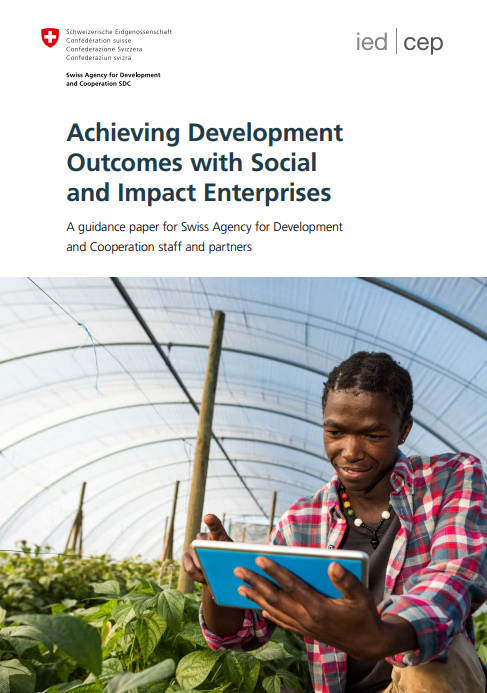
SDC
[2.8 MB]
Private sector engagement (PSE) is a priority for the Swiss Agency for Development and Cooperation (SDC), as highlighted in the federal dispatch 2021-2024. Within the universe of potential private sector partners, Social and Impact Enterprises (SIEs) – those enterprises with an intention to solve a social or environmental problem – are a natural ally for actors like SDC to achieve development outcomes. There are several reasons that make working with SIEs particularly interesting. There is an explicit alignment of vision and commitment to address a development challenge, when compared to other private sector partners. SIEs strive to be profitable and are sustainable beyond SDC support, when compared to not-for profit partners. They can therefore achieve high impact in a cost-effective way for SDC, since support is only supplemental and short-term. They can also promote highly innovative ways of achieving SDGs which can stimulate learning at SDC. That said, PSE overall and SDC working with SIEs in particular, is a relatively new way of achieving development outcomes. Challenges include: questions on how to find the right partner, the ideal governance for a partnership, the best financial instruments to support the SIE, and impact management. Partnerships with SIEs require careful design and agile implementation management. This guidance paper, the first of its kind, highlights some of these emerging issues. While the insights presented here do not constitute conclusive guidance on how to successfully engage SIEs, we discuss noteworthy findings and potential solutions
SDC E+E / FCHR
[7.2 MB]
SDC's thematic units Economy and Education (E+E) and Peace, Governance and Equality (PGE) engaged on a workstream to provide SDC staff with practical guidance on i) how to plan and implement IED projects in fragile contexts, taking into account the particular challenges of fragile contexts and ii) how IED projects can go beyond the minimalist approach of doing no harm (working in conflict/ fragility) by explicitly contributing to reduce fragility (working on conflict/fragility). This practical guidance sheet should be considered as additional practical tips to the slide deck and FAQ published on the shareweb (links below): Slide Deck: Inclusive economic development (IED) in fragile contexts FAQ: IED in fragile contexts Slide Deck
SDC
[14.4 MB]
A summary of lessons learned by Market Systems Development Practitioners. This document aims to capture some lessons and tips on how to form and manage partnerships with Private Sector Actors. Topics: • Who to partner with? • How to find and contact partners? • Deal making: how and what to negotiate? • Financing: what and how? • Contractual arrangements: what to consider? • Managing partnerships
Reference Indicators and Measurement
SDC
[2.5 MB]
To monitor the implementation of Switzerland's international cooperation strategy for 2021 - 2024, SDC has approved a set of reference indicators according to the 10 sub-objectives of the strategy. Result indicators allow to assess outcomes and outputs achieved with SDC support. E+E has a total of 10 TRIs 5 IED TRIs Thematic Result Indicators 5 EDU TRIs Thematic Result Indicators
Case Studies
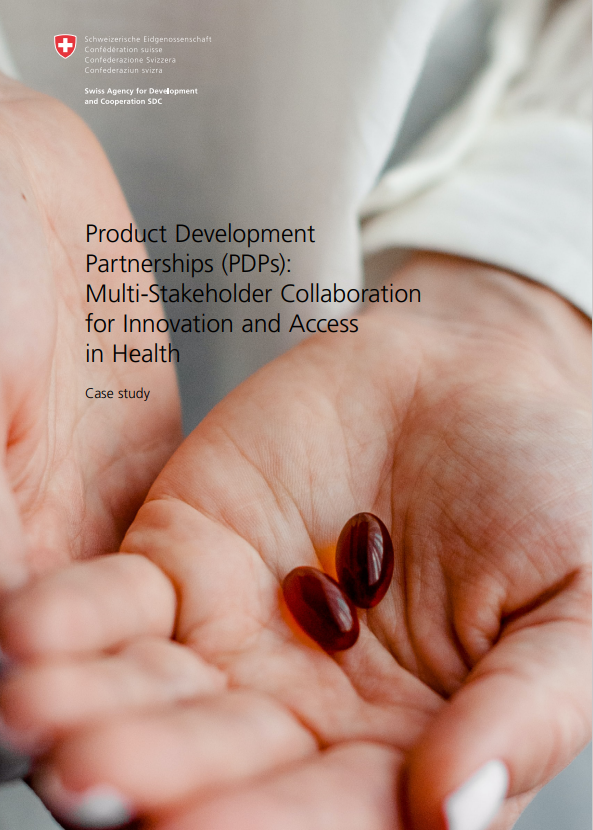
SDC
[3.1 MB]
Poverty related neglected diseases (PRND) such as tuberculosis, malaria, and HIV affect predominantly the world’s poorest countries where there is limited health care infrastructure, a lack of universal insurance schemes as well as low economic power of patients to pay for necessary medical treatment. As a result, there has been little financial incentive for the global pharmaceutical industry to invest in research and development (R&D) to develop effective medical products that improve the health situation of people in lower and middle income countries (LMIC).
PDPs now have an important role to play in shaping the global health R&D system for equitable access to health products and technologies in LMIC and beyond. Important issues that influence the future of PDPs are an increased focus on access consideration in the product lifecycle, new funding models, synergies between PDPs, enhanced coordination in the global health R&D system, the influence of technology and digitalisation of processes, and data collection for costing.
SDC
[1.7 MB]
Social Impact Incentives (SIINC) are an innovative finance tool that uses public and philanthropic finance to help Social and Impact Enterprises (SIEs) grow and scale their impact and make them more attractive for private providers of capital. SIINC has gained significant traction with major players in the field, and it is increasingly being recognized and adopted by important actors in the international impact eco-system. The SIINC concept of rewarding impact has evolved into a wider range of impact-linked finance instruments and led to the establishment of an Impact-Linked Finance Fund
SDC
[1.1 MB]
This case study is about the Impact-Linked Finance Fund (ILFF), a funding mechanism that pools and manages impact-linked finance (ILF) resources and builds the nascent ILF eco-system. ILF refers to a growing portfolio of financing solutions for high-impact market-based organisations that directly link financial rewards to the achievement of positive social outcomes and mobilises private investments.
The work of the Fund will be shaped by several trends and factors, including the increased availability of evidence and data, the use of digital tools and effective self (or user) reporting, an increased willingness to experiment with the full range of ILF solutions, to learn from these experiments and to share findings, and a rapid expansion to a wider range of actors in the social, private and public sector including traditional start-ups, corporations, and financial institutions.

SDC
[2.3 MB]
Aceli Africa provides support and smart incentives to commercial lenders and impact investors to finance high-impact low-profit agri-enterprises in Africa that would otherwise not be served by financial institutions due to risk and profitability concerns. Aceli aims at incentivising capital suppliers to provide more finance to high-impact agri-enterprises than what these lenders would otherwise be prepared to finance given risk and profitability concerns. In that way, Aceli seeks to positively impact livelihoods of farmers, workers, and their communities as well as the local environment. Ultimately, Aceli aims at creating a more effective and inclusive marketplace for high-impact agriculture finance in Africa that will be adopted by governments locally and become sustainable and independent of donor funding in the long term. Aceli adapts a financing innovation that has been co-created by the Swiss Agency for Development and Cooperation (SDC) for social and impact enterprise finance, the so-called Social Impact Incentives (SIINC), to the new context of agricultural lending in Africa.
[1 MB]
At the end of 2019 Nestle and SDC initiated and jointly fund and steer a project that strengthens INFOCAL Santa Cruz, a private non-profit centre created by the National Enterprise Chamber of Bolivia.
Evaluations and Reviews
SDC
[238 kB]
SDC uses Private Sector Engagement (PSE) in order to foster innovation and achieve greater impact. PSE are interventions where SDC and one or several private sector partners share a vision and join forces for an impact-driven development intervention, in support of the SDC's existing strategies. Presentation of the webinar
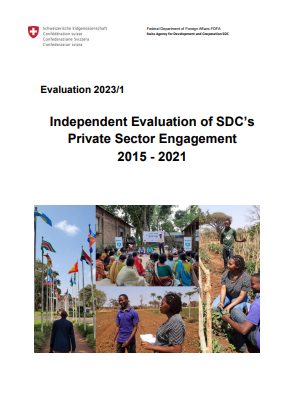
SDC
SDC commissioned an independent evaluation of SDC’s Private Sector Engagement (2015-2021). The evaluation assessed the performance of SDC’s programmes and projects along the OECD DAC criteria of relevance, coherence, effectiveness, impact, efficiency, and sustainability. The evaluation aims to support SDC in achieving the objectives of Switzerland’s International Cooperation Strategy 2021-2024, and in contributing to achieving the Sustainable Development Goals (SDGs). Overall, the evaluation found that the diligent effort and significant resources invested by the SDC in its PSE are paying off in innovation, learning and results progress. However, there are some crucial issues SDC still must address for its PSE to achieve its full potential. In terms of PSE usefulness to contribute to SDC and its partners’ goals, the evaluation found that the Agency is effective. It is, however, well-positioned to do more in the short and medium terms. To do so, the Agency needs to better strategize its way forward. SDC’s PSE modality is working well to foster partnerships with the private sector. Yet, to ensure that PSE contributes to the goals of the private sector, SDC must take their needs and priorities into consideration. PSE is useful to contribute to partner countries’ goals. Projects normally match partner countries’ national needs and priorities. Nevertheless, the evaluation also highlighted the lack of involvement of the governments themselves in SDC’s PSE projects. While PSE focuses mainly on creating synergies with the private sector, it is also important to have national governments involved, including authorities at the sub-national level. Link to the presentation.
Relevant News
-
31 May 2024
-
31 May 2024
-
31 May 2024
-
29 May 2024
-
13 May 2024
-
15 Apr 2024
-
03 Mar 2024
-
27 Feb 2024
-
27 Feb 2024
-
21 Dec 2023
-
15 Dec 2023
-
05 Dec 2023
-
05 Dec 2023
-
05 Dec 2023
-
29 Nov 2023
-
25 Oct 2023
-
16 Oct 2023
-
14 Sep 2023
-
14 Sep 2023
-
10 Sep 2023
-
08 Sep 2023
-
07 Sep 2023
-
24 Jul 2023
-
23 Jul 2023
-
20 Jul 2023
-
15 Jun 2023
-
07 Jun 2023
-
17 May 2023
-
31 Mar 2023
-
15 Mar 2023
-
15 Mar 2023
-
15 Mar 2023
-
14 Mar 2023
-
14 Mar 2023
-
13 Feb 2023
-
19 Dec 2022
-
05 Dec 2022
-
03 Dec 2022
-
01 Dec 2022
-
17 Nov 2022
-
11 Oct 2022
-
23 Sep 2022
-
25 Aug 2022
-
05 Jul 2022
-
22 Jun 2022
-
02 Jun 2022
-
01 Jun 2022
-
21 Mar 2022
-
10 Sep 2019
-
17 Jun 2019
-
29 Aug 2018
-
02 Jul 2018
-
26 Jun 2018
-
26 Jun 2018
-
16 Mar 2018
-
19 Sep 2017
-
11 Sep 2017
-
12 Jun 2017
-
26 May 2017
-
18 May 2017
-
28 Nov 2016
-
07 Sep 2016
-
23 Mar 2016
-
30 Nov 2015
-
03 Sep 2015
 31 May 2024
During the regional workshop on Private Sector Engagement (PSE) and Inclusive Green Economy (IGE) in Bangkok, a session focused on the inclusive green economy and green transition. Key points included integrating green skills into projects, addressing climate change vulnerabilities in ASEAN, defining green skills, adopting a human-centered approach for a just transition, and the role of government policies and the private sector in promoting green jobs and skills.
For more information click here.
 31 May 2024
T he regional workshop on SDC’s future work on Private Sector Engagement (PSE) and Inclusive Green Economy (IGE) took place in Bangkok from 6-8 May 2024. Colleagues from various offices discussed integrating PSE and IGE into programmes. The event marked the first in-person meeting of the regional E+E network, fostering cross-learning and thematic alignment. Objectives included strengthening collaboration, sharing experiences, familiarising participants with PSE and IGE concepts, and developing project ideas. he regional workshop on SDC’s future work on Private Sector Engagement (PSE) and Inclusive Green Economy (IGE) took place in Bangkok from 6-8 May 2024. Colleagues from various offices discussed integrating PSE and IGE into programmes. The event marked the first in-person meeting of the regional E+E network, fostering cross-learning and thematic alignment. Objectives included strengthening collaboration, sharing experiences, familiarising participants with PSE and IGE concepts, and developing project ideas. find a plethora of information: here
 31 May 2024

The second edition of the Inclusive Economy Open Mic Series by the E+E section took place on April 29, 2024, featuring Frédérique Weyer, RTA for PSE and Food Security in Nairobi. Frédérique shared key insights about her work and the priorities and challenges for SDC's PSE/PSD work in Africa. The Open Mic series provides a platform for informal exchanges on selected topics and ongoing work related to inclusive economic development. The next Open Mic will be announced soon.
>> more
 29 May 2024
To improve aid effectiveness, international development funding is shifting from traditional input-based methods to results-based approaches to maximize impact, and Switzerland is a frontrunner in this movement. RBF conditions a portion of program funding to measurable results. Thereby, RBF incentivizes all actors to maximize the results that matter, fosters a culture of performance, and generates evidence for impact. SECO and SDC apply RBF with both private and public sector actors across a wide range of sectors and geographies to improve social outcomes. This document provides the rationale behind RBF, its progress, as well as a vision for the future of RBF. A recent review by Instiglio, an independent advisory firm working closely with public and private sector on innovative financing, highlights 51 diverse Results-Based Finance experiences by the SDC and SECO. You can read the key findings here. Additionally, this overview of case studies provides an insight into Swiss RBF experiences in various countries such as Serbia, Colombia, Nepal, and Kenya.
If you want to hear more on how the SDC and SECO staff applies RBF to leverage impact in development cooperation projects, you can watch the following video where key learnings, and successes with RBF are shared as well as this video for the next steps in RFB.
Lastly, if you are keen to spread to word on this important topic, please feel free to like, comment or share the social media posts on Linkedin and X. Thank you very much!
 13 May 2024

Regional F2F Asia in Bangkok - 6-8 May 2024The regional workshop on SDC’s future work on Private Sector Engagement (PSE) and Inclusive Green Economy (IGE) - co-organized by SDC’s Asia-LAC Division and the Economy and Education section, and hosted by the regional thematic hub in Bangkok – took place from May 6-8. Colleagues from the cooperation offices in India, Bangladesh, Myanmar, Laos, Cambodia and the regional thematic hub in Bangkok discussed approaches for integrating PSE and IGE in ongoing or in upcoming programmes. Three new financial-market oriented PSEs are being developed in the region this year and green skills is at the forefront of the TVET portfolios. The event also marked the first in person meeting of the regional E+E network and allowed for cross learning and thematic alignment of formerly different types of cooperation offices (traditional country offices; the TZ office in India; the former DRR hub in Bangkok) and strengthened the exchange between the topics E+E and CDE, including CEDRIG. Objectives of the event: - Strengthen the collaboration between thematic and geographic divisions in line with F4P and promote thematic regional networks in Asia by sharing experiences among SDC staff working in the Asia region
- Familiarize participants with basic concepts of PSE and inclusive green economy (IGE)
- Develop project ideas for (i) new PSE and IGE projects in country; (ii) “greening” existing projects or looking at existing projects through a PSE lens; (iii) better integrate the activities related to PSE and IGE from a regional perspective;
For more information click here
 15 April 2024
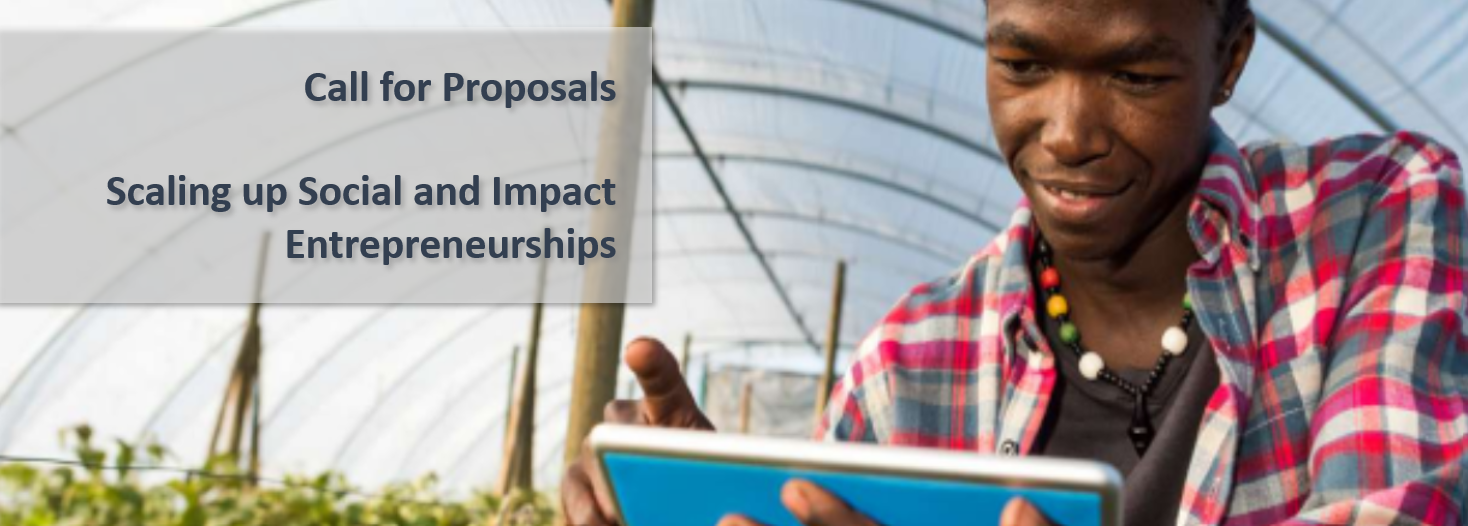
Decision on concept selectionIn total, the evaluation team carefully assessed 41 submitted proposals against the criteria set out in the Call for Proposals and spoke to the top 5 ranked organisations/consortia about their proposal. We thank all submitting organisations for their work, efforts and ideas. Due to budget constraints, we can only implement one proposal. However, we hope that the various excellent ideas will be implemented in the near future, with or without SDC involvement. The selected proposal is that of the Draper Richards Kaplan Foundation, the Amahoro Coalition and GrowthAfrica. It will be further developed in a joint process with SDC over the coming months. Once again, many thanks for your commitment and the excellent ideas and proposals submitted. Best regards, SDC E&E Team - Selection Committee
 03 March 2024
We are excited to share that we have just launched a fresh series of events designed to bring us together in a more informal setting. It's not just about showcasing our "final" products, but also about learning, sharing updates, understanding how others tackle projects, and gaining insights from various processes. The series is called: The Inclusive Economy Open Mic. The experiences will be shared with the education network for (mutual) learning and uploaded to the E+E shareweb. More information: here
 27 February 2024
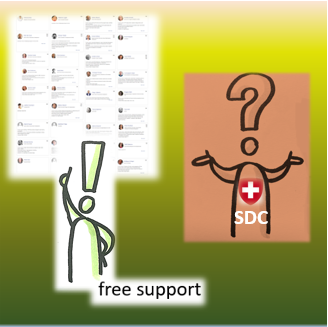
SDC E+E network members can ask for support from a pool of external experts for up to 3 days for PSD, VSD and FSD projects and for up to 4 days for PSE projects. You can use this service without any contracting and free of cost or administrative work for your unit. If your request is of general interest, the E+E network may even be able to cover for more than the above-mentioned duration. Find more information here on our shareweb.
Are you curious to learn how other colleagues have used this offer?
- Four colleagues from the SDC Chad and two colleagues from SDC Niger requested a tailored Market Systems Development (MSD) Training through the free support by external experts. The training took place between mid-October and mid-November 2023, consisting of online classes and offline homework. The participants not only benefitted from conceptual inputs and practical work on their own projects, but this also offered the opportunity to exchange and strengthen the connection between the two offices. - Several SDC head office staff (VSD, PSD, PSE) and country offices requested further information about the possibility of engaging Swiss institutions and experts in hospitality and tourism. Online exchanges took place in the form of a question-and-answer session, followed by a mapping of the main Swiss actors and the sharing of additional resources. The participants benefitted from learning about previous SDC and SECO projects and an analysis of the different actors regarding their potential involvement in the different types of projects. More information: here
 27 February 2024
Do you also wish to learn more about how development programmes can make a meaningful contribution to changing the existing economic system to an Inclusive Green Economic (IGE) system?
Then join the SDC Economy network’s upcoming series of consultation tables on Green Skills, Circular Economy and Green Finance. You will find more information about the consultation process, outcomes and interesting reading materials on our newly created Shareweb page “Inclusive Green Economy”.
Looking at skills in the Inclusive Green Economy: The Donor Committee on dual VET (DC dVET) is conducting a series of interactive online Barcamps (Webinars) between October 2023 and June 2024. You can find more information on our new Shareweb page "Inclusive Green Economy".
Graph: See the "Inclusive Green Economy Orientation paper" (2023), page 9, for complete graph.
 21 December 2023

In continuation of our BarCamp series on the role of dual VET in a just green transition, the DC dVET is inviting to the next BarCamp. For the organization of these BarCamps they newly collaborate with a Committee of Interest (COI) composed by representatives of the Austrian Labour Market Service Niederösterreich (AMS), GIZ, Helvetas, Swisscontact and the VET Toolbox. This 2nd BarCamp will serve as interactive platform to discuss and exchange on parameters for a successful inclusion and collaboration with the business sector: The role of the business sector in dual VET for a just green transition
Tuesday, 23rd January 2024, 12:00 – 2:00pm CET The program includes: Keynote speech: Let’s hear from a representative of the business sector on the motivation to invest in green skills for a just transition and how the intersection between sustainability and VET as well as the Environment, Social and Governance (ESG) approach can foster dual VET in a just green transition. Exchange Sessions: Let’s bring in your own experiences and discuss them with others - join one of the sessions and discuss your perspective with business representatives and projects addressing the nexus of VET and just green transition. If you want to host your own session, please indicate this in the registration form – we are here to support you. Please register here: here
 15 December 2023
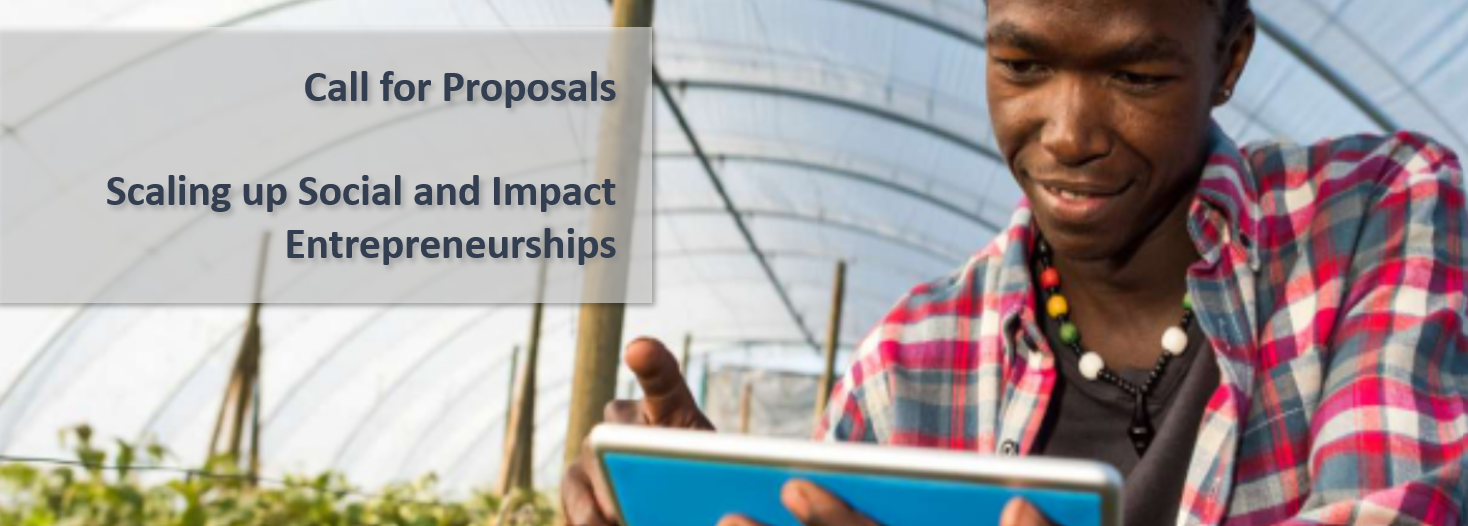
The Section Economy and Education of the Swiss Agency for Development and Cooperation has opened a Call for Proposal looking for innovations in Scaling up Social and Impact Entrepreneurships.
All the necessary information regarding this Call for Proposal is available in the following documents:
1 - Call for Proposal: Scaling up Social and Impact Entrepreneurship - here 2 - Standard contract: Federal contribution for project - here 3 - Standard contract: Contribution outside Switzerland - here 4 - General conditions for contracts concerning federal contributions for projects - here
Questions related to this Call for Proposals can be submitted by email to the following address kep@eda.admin.ch with the subject: “Scale up Social and Impact Entrepreneurship”. All questions and relative answers will be anonymously and openly available on this website.
Deadline submission of questions round 1: 22 December 2023 Publication responses to questions / round 1: 8 January 2024 - The answers to your questions are now avaliable here Deadline submission of questions round 2: 15 January 2024 Publication responses to questions / round 2: 24 January 2024 - The answers to your questions from round 1 and 2 are now avaliable here
The proposals have to be submitted by 29 February 2024, 24:00 CET at the latest to the following email address: kep@eda.admin.ch with the subject: “Scale up Social and Impact Entrepreneurship”.
In August 2023, SDC organised a physical ideation workshop on SIEs together with some European-based SIE expert organisations, many of which SDC has already worked with on this topic. In September and October 2023, it shared and discussed the “take aways” from this workshop in four virtual brainstorming sessions with interested stakeholders, many of them regional and local organisations from the Global South, many of which expressed an explicit interest to SDC’s section E&E in collaborating within the framework of this upcoming project. The “take aways” from the ideation workshop are available here The list of organisations who expressed an explicit interest to SDC’s section E&E in collaborating within the framework of the project is attached to the document “Call for Proposal: Scaling up Social and Impact Entrepreneurship”.
 05 December 2023
 05 December 2023
Businesses have a responsibility to respect human rights. On the 15th of November 2023, the Federal Council recommitted to implementing the UN Guiding Principles on Business & Human Rights in Switzerland and tasked the PHRD and SECO with updating the Business and Human Rights National Action Plan for 2024-2027 (NAP). Click here to learn more and find tools and guidance on how to promote human rights in the private sector in your work.
Check out the video series on business and human rights, where human rights due diligence and risk analysis are explained.
 05 December 2023
As part of SDC’s 16 Days of Activism against Gender-Based Violence (GBV) Campaign, the Empower! Podcast released a new episode on GBV prevention. Listen to Rana Al-Motairi and Reine Musharbash from the International Rescue Committee explain how they use women's economic empowerment as an entry point to engage men and boys in the prevention and reduction of GBV in refugee camps and the wider society in Jordan. Get inspired by this or any of the previous 11 episodes: here.
 29 November 2023
Are you interested in thematic mentoring, or have you recently joined the Economy and/or Education Networks as an NPO or in another role and are eager to learn? Mentoring is a renowned technique for personal development and professional growth that benefits both parties. Click here to access the information brochure and registration form. We will make sure you are matched with the right person based on your interests and experience.
 25 October 2023

The Gender Scaling Financing Facility (GSFF) is an ambitious initiative to power the growth of gender-mainstreamed social enterprises across Latin America, promoted by LeFil Consulting and Pro Mujer with the support of the Swiss Development and Cooperation agency (SDC). It targets 100 impact-driven, market-based ventures operating in the region, ranging from small to large size, with no restrictions on sector. Go to page Gender Scaling Financing Facility - GSFF
 16 October 2023

Achieving Social Impacts in the Energy Access SectorKey Takeaways from EnDev’s Social Impact Incentives (SIINC) Off-Grid Energy Pilotfinanced by the Swiss Agency for Development and Cooperation (SDC)
EnDev is excited to share a lessons learnt report from the completed implementation of our recent pilot project in Kenya: an explicitly impact-oriented Results-based Financing (RBF) project. Piloting this so-called SIINC project in the field of energy access gives us insights and food for thought for the future of RBFs. Click here for the full news article & video. Social Impact Incentives (SIINC) was co-developed by the Swiss Agency for Development and Cooperation and Roots of Impact. It is a financial instrument that rewards enterprises for achieving social impact – instead of pure sales figures. The aim is thus to leverage funds to catalyse private investment in underserved markets to generate impact. Energising Development (EnDev) is a strategic partnership of likeminded donors and partners to support access to modern energy. The driving forces behind EnDev are Germany, the Netherlands, Norway and Switzerland.
 14 September 2023
Building Bridges is a joint initiative, launched in 2019 by Swiss public authorities (incl. SDC), the finance community, the United Nations and other International partners to accelerate the transition to a global economic model aligned with the SDGs. At the core of the initiative is the recognition that the scale and complexity of the transition require “building bridges” between multiple stakeholders in the finance, government, and international development communities. This year's edition will take place between October 2-6 in Geneva and host keynote speakers such as Ngozi Okonjo-Iweala (Director-General of the World Trade Organization (WTO), Mahmoud Mohieldin (Executive Director of the International Monetary Fund (IMF) or Sergio Ermotti (Group Chief Executive Officer of UBS). Amongst 70 events organized by over 130 organizations, on October 4, SDC will be co-hosting a panel dedicated to Innovative Financing for Entrepreneurial Solutions in Emerging Markets.
 14 September 2023
SDC commissioned an independent evaluation of SDC’s Private Sector Engagement (2015-2021). The evaluation assessed the performance of SDC’s programmes and projects along the OECD DAC criteria of relevance, coherence, effectiveness, impact, efficiency, and sustainability. The evaluation aims to support SDC in achieving the objectives of Switzerland’s International Cooperation Strategy 2021-2024, and in contributing to achieving the Sustainable Development Goals (SDGs). The full evaluation report, including SDC’s Senior Management Response can be found here.
 10 September 2023
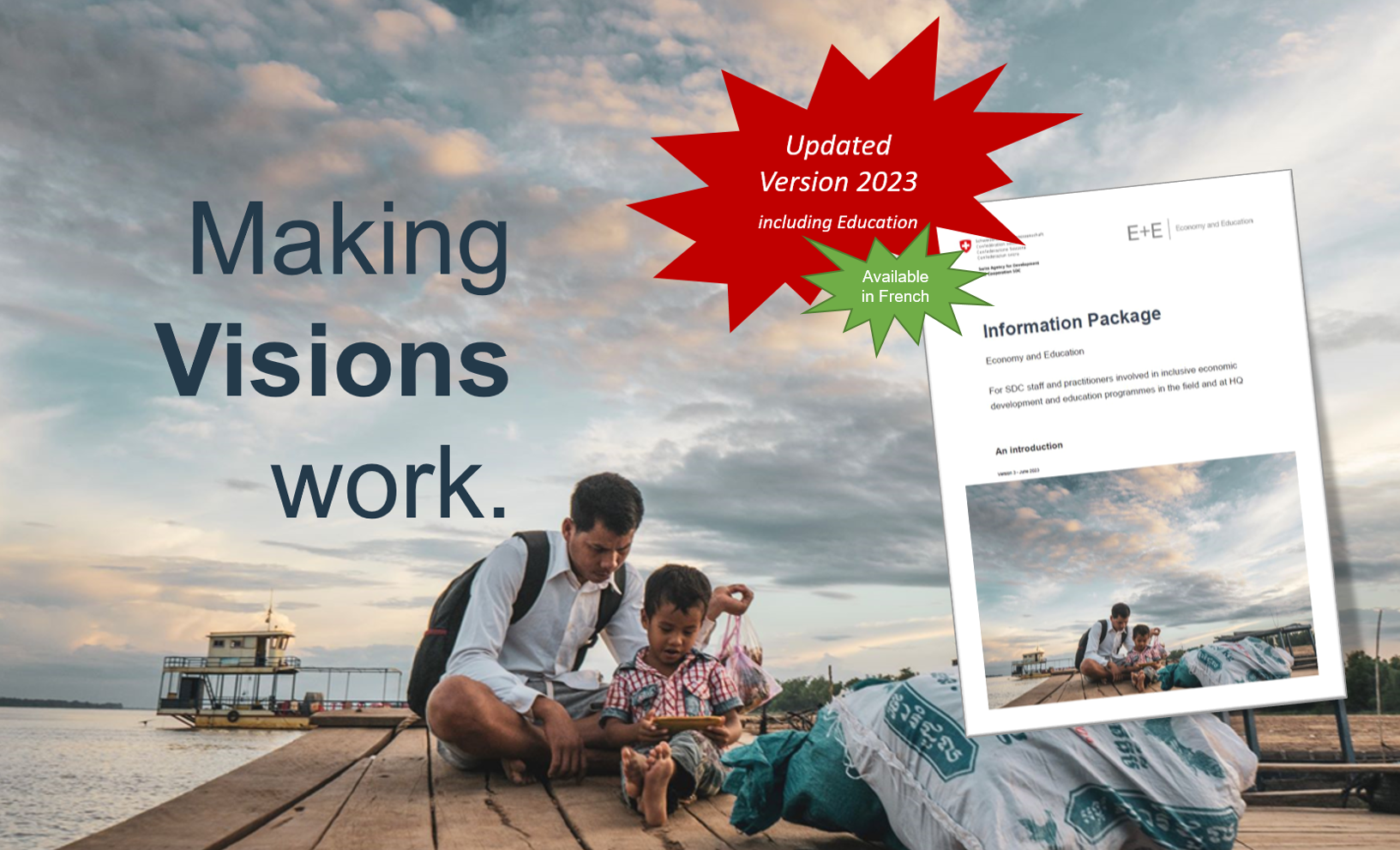
Updated E+E Information Package of the Topics Economy and Education - Fit for PurposeClick here for the version in french The Information Package is made for SDC staff and practitioners working towards the creation of inclusive economic development programmes as well as quality education and lifelong learning opportunities for all. It provides an introduction into E+E approaches and ways of systemic thinking through four interlinked priorities on system and beneficiary level: Education, Vocational Skills Development, Private Sector Development and Financial Sector Development and the modality of private sector engagement. Updated version June 2023 - An easy to read introduction for a quick overview of the topics Economy and Education This two-pager provides a short introduction into the Economy and Education Network for SDCdecision makers.
 08 September 2023

Engaging with the business sector remains one of the recurring challenges in dual VET. In their upcoming webinar & subsquent expert consultation DC dVET provides the opportunity to engage with Prof. em. Dr. Dieter Euler, one of the leading experts in this field: Webinar (19 September 2023, 12:00 – 1:00pm CET): Prof. Euler who is the author of the DC dVET working tool on engaging the business sector will provide an input on the essential needs for effective cooperation with the business sector and on particularly relevant framework conditions. In his input Prof. Euler will also refer to his latest research which will be published in November 2023 “Roadmap to high-quality dual VET”. Among others, the presentation will include insights into a country example from Albania. Expert consultation (26 September 2023, 12:00 – 1:30pm CET): The webinar will be followed by an expert consultation, during which you can ask questions to Prof. Euler around your own challenges and discuss them with him and the other participants. Registration: Please register for the webinar and/or the expert consultation: Register here
 07 September 2023

The Swiss Agency for Development and Cooperation (SDC) has expanded its Private Sector Engagement (PSE) portfolio over the past years. In 2021, it introduced the Investment Credit designed to facilitate direct investments into structured funds or granting impact-linked loans. This credit aims to foster innovation, and leverage private finance to achieve the Sustainable Development Goals (SDGs), with a specific focus on Least Developed Countries (LDCs) and underserved sectors. Managed by the Competence Centre for Engagement with the Private Sector (CEP), this credit has already approved two investments in 2022 and 2023, respectively. As of 2024, 4.9 million CHF is available for investment, enabling the development of 1-2 ventures aligned with SDC’s objectives at the thematic or country levels. The SDC Investment Credit represents a strategic initiative to foster private sector investments for the SDGs. By leveraging private finance and embracing innovative ventures, SDC is committed to driving meaningful impact in LDCs and underserved sectors, while adhering to relevant criteria for investment selection and measurement
 24 July 2023
 The ILO's Impact Insurance Academy is a unique opportunity to learn from more than fifteen years of experience and innovations in inclusive insurance facilitated by the ILO's Impact Insurance Facility. The ILO's Impact Insurance Academy is a unique opportunity to learn from more than fifteen years of experience and innovations in inclusive insurance facilitated by the ILO's Impact Insurance Facility.
Uninsured risk has devastating consequences for future generations and constrains their entrepreneurial capacities. In many developing countries, however, the insurance industry is not yet fulfilling its potential. The ILO's Impact Insurance Facility works to enable the insurance sector, governments and their partners to embrace impact insurance as a way of reducing households' vulnerability, promoting stronger enterprises and facilitating better public policies. As part of its efforts to empower the insurance industry, governments and their partners to realize the full potential of insurance, the ILO's Impact Insurance Facility and the ITCILO are together running an Impact Insurance Academy. Link to the training
 23 July 2023
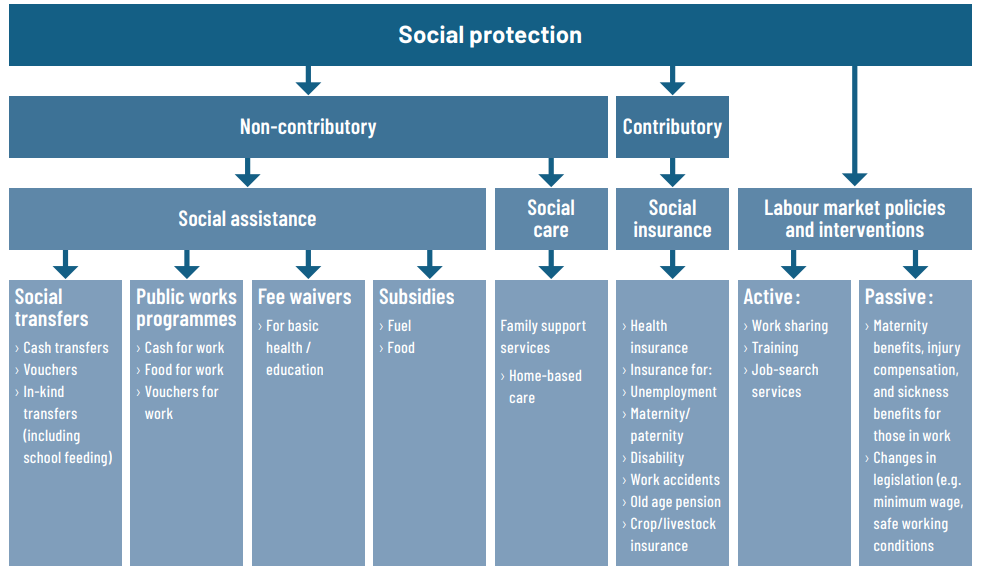
This working aid (including toolbox) on social protection provides concrete guidance for the SDC staff to engage in social protection programmes and policies. Social protection supports people in need at different stages in life and protects them against risks, such as illness, accident or unemployment. In this way, social protection helps to combat poverty and contributes to social equality and justice. By boosting human capital and productivity and supporting domestic demand, it facilitates structural transformation of national economies. The lack of access to social protection is a major obstacle to economic and social development.
Link to the social protection working aid.
 20 July 2023

Since September 2022, the Inclusive Economic Development and the Education teams of SDC joined forces to become the new thematic Section Economy and Education. This two-pager provides a short introduction into the Economy and Education Network for SDC decision makers.
 15 June 2023
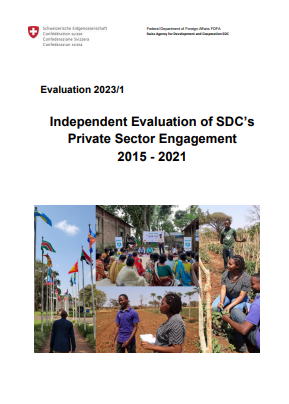
SDC commissioned an independent evaluation of SDC’s Private Sector Engagement (2015-2021). The evaluation assessed the performance of SDC’s programmes and projects along the OECD DAC criteria of relevance, coherence, effectiveness, impact, efficiency, and sustainability. The evaluation aims to support SDC in achieving the objectives of Switzerland’s International Cooperation Strategy 2021-2024, and in contributing to achieving the Sustainable Development Goals (SDGs). Overall, the evaluation found that the diligent effort and significant resources invested by the SDC in its PSE are paying off in innovation, learning and results progress. However, there are some crucial issues SDC still must address for its PSE to achieve its full potential. In terms of PSE usefulness to contribute to SDC and its partners’ goals, the evaluation found that the Agency is effective. It is, however, well-positioned to do more in the short and medium terms. To do so, the Agency needs to better strategize its way forward. SDC’s PSE modality is working well to foster partnerships with the private sector. Yet, to ensure that PSE contributes to the goals of the private sector, SDC must take their needs and priorities into consideration. PSE is useful to contribute to partner countries’ goals. Projects normally match partner countries’ national needs and priorities. Nevertheless, the evaluation also highlighted the lack of involvement of the governments themselves in SDC’s PSE projects. While PSE focuses mainly on creating synergies with the private sector, it is also important to have national governments involved, including authorities at the sub-national level. The evaluation report including the senior management response can be found here. Link to the presentation
 07 June 2023
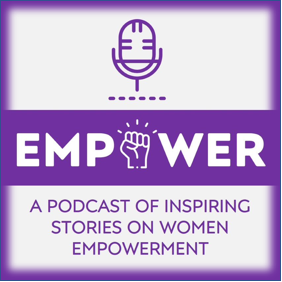 Empower, a podcast of inspiring stories on women’s empowerment, is brought to you by the PGE and E+E section. Empower, a podcast of inspiring stories on women’s empowerment, is brought to you by the PGE and E+E section.
The latest episode is on how human trafficking survivors rebuild their lives in Bangladesh. Our guest Dipta Rakshit from Winrock International talks about the hardships of returned trafficking survivors and how project Ashshash supports them with a holistic approach that includes skills and entrepreneurship training
 17 May 2023

The bi-annual training workshop has gained a reputation for empowering the practitioners who are driving the field forward to meet new and on-going challenges in results measurement for improved management, greater accountability and better results. This year's workshop will be in-person in Bangkok. It will bring together experienced results measurement practitioners for five focused days of learning practical approaches, sharing challenges and tips and contributing lessons to the field. The main theme of the workshop this year will be assessing system change including dimensions of system change particularly relevant to PSD programs today. Link to the flyer.
 31 March 2023
The guidelines aim to advise SDC staff and partners how to identify and make use of the interlinkages between BE and VSD to equip people with the skills they need to develop both as an individual and as a member of society and to access productive employment. The guide shows why a combination of basic education and vocational skills are needed for decent work4 and for inclusive, sustainable economic development, and how the SDC can operationalise BE–VSD interlinkages in the context of education, vocational education and training (VET), inclusive economic development, or programmes in other fields, e.g. migration, that aim to prepare people for labour market integration.
 15 March 2023
Since 2020, the Annex 2 exercise, carried out as part of the annual reports of SDC’s operational units, provides a picture of SDC’s Private Sector Engagement (PSE) portfolio. As a modality, PSEs are implemented across all of SDC’s priority topics and they are diverse in terms of objectives and private sector partners. By comparing data from SAP with information entered by operational units, we get an understanding of the universe of PSE projects SDC is engaged in. Last year, the Annex 2 database allowed SDC, for the first time, to report to the OECD on mobilizing private sector funding. You can find the overview here.
 15 March 2023
Since 2020, the Annex 2 exercise, carried out as part of the annual reports of SDC’s operational units, provides a picture of SDC’s Private Sector Engagement (PSE) portfolio. As a modality, PSEs are implemented across all of SDC’s priority topics and they are diverse in terms of objectives and private sector partners. By comparing data from SAP with information entered by operational units, we get an understanding of the universe of PSE projects SDC is engaged in. Last year, the Annex 2 database allowed SDC, for the first time, to report to the OECD on mobilizing private sector funding. Here you can find the latest insights: https://www.shareweb.ch/site/EI/Documents/Topics/Private%20Sector%20Development/Overview%20PSE@SDC%202022-%20Results%20from%20Annex%202.pdf
 15 March 2023

The “Education for Future”, the International Cooperation Forum Switzerland (IC Forum) 2023 was focused on education. Good basic education and training are crucial for sustainable development, yet education systems around the world are facing major challenges. Switzerland has been championing the right to education for many years. Both basic education and vocational skills development are vital cornerstones of Switzerland's international cooperation. At the Forum, representatives of 120 countries participated physically and online. The Mongolian representatives of education and environment sectors have attended the IC Forum 2023 in-person. They also presented the results of the Education of Sustainable Development (ESD-II) project in Mongolia. SDC is supporting the ESD in Mongolia since 2014. While the first phase succeeded to mainstream the ESD in the secondary education curricula, the second and final phase of the project focused on the actual transformative actions for sustainable development in the schools and communities. The local schools are empowered to drive the transformation by promoting sustainability actions in both isolated rural nomadic communities and the capital city. The schools were able to raise significant funds for their actions due to improved collaboration between national and subnational stakeholders, private and public players. The actual local commitment was 70% greater than the planned amounts. Bringing together representatives from various sectors to discuss and implement sustainable development actions was a critical success factor. Another enabling factor was the full delegation of implementation responsibility to the national government and non-governmental partners. The actions had a significant impact on local social, environmental, and cultural aspects, benefiting 29‘500 students, their families, and communities. The Mongolian delegation's participation in the IC Forum was part of a larger program in which they met representatives from the Swiss Conference of Cantonal Ministers of Education, Education 21, Movetia, Silviva, CDE of Bern University, and UNESCO IBE. Mongolia is at a crossroads in terms of defining a new curriculum concept and revising its educational laws. In order to provide inclusive and quality education for all, it is critical to incorporate sustainable development and ESD into the vision and concept of the education system while carefully considering the national and cultural values. As requested by UNESCO IBE, Mongolia will share its experiences of the transformation to the global community. 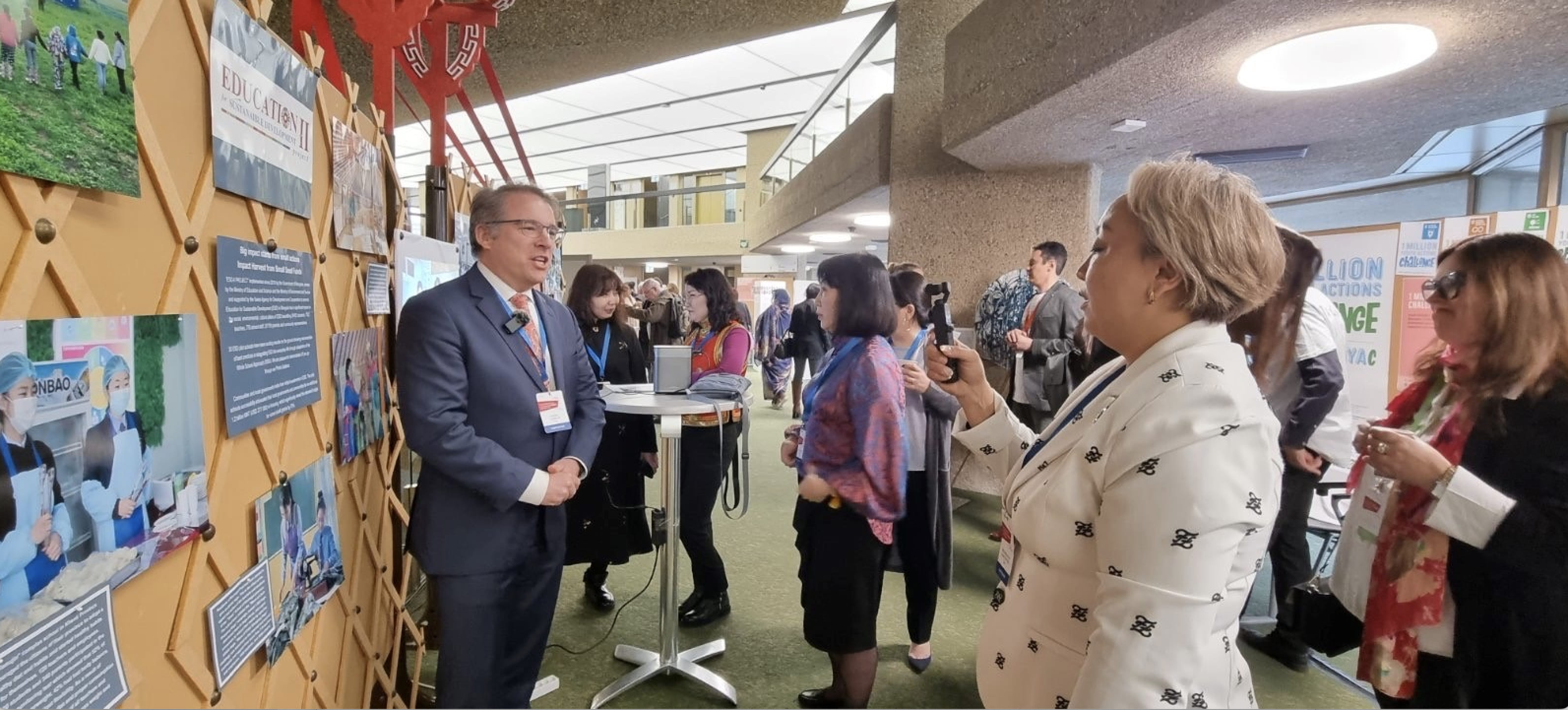
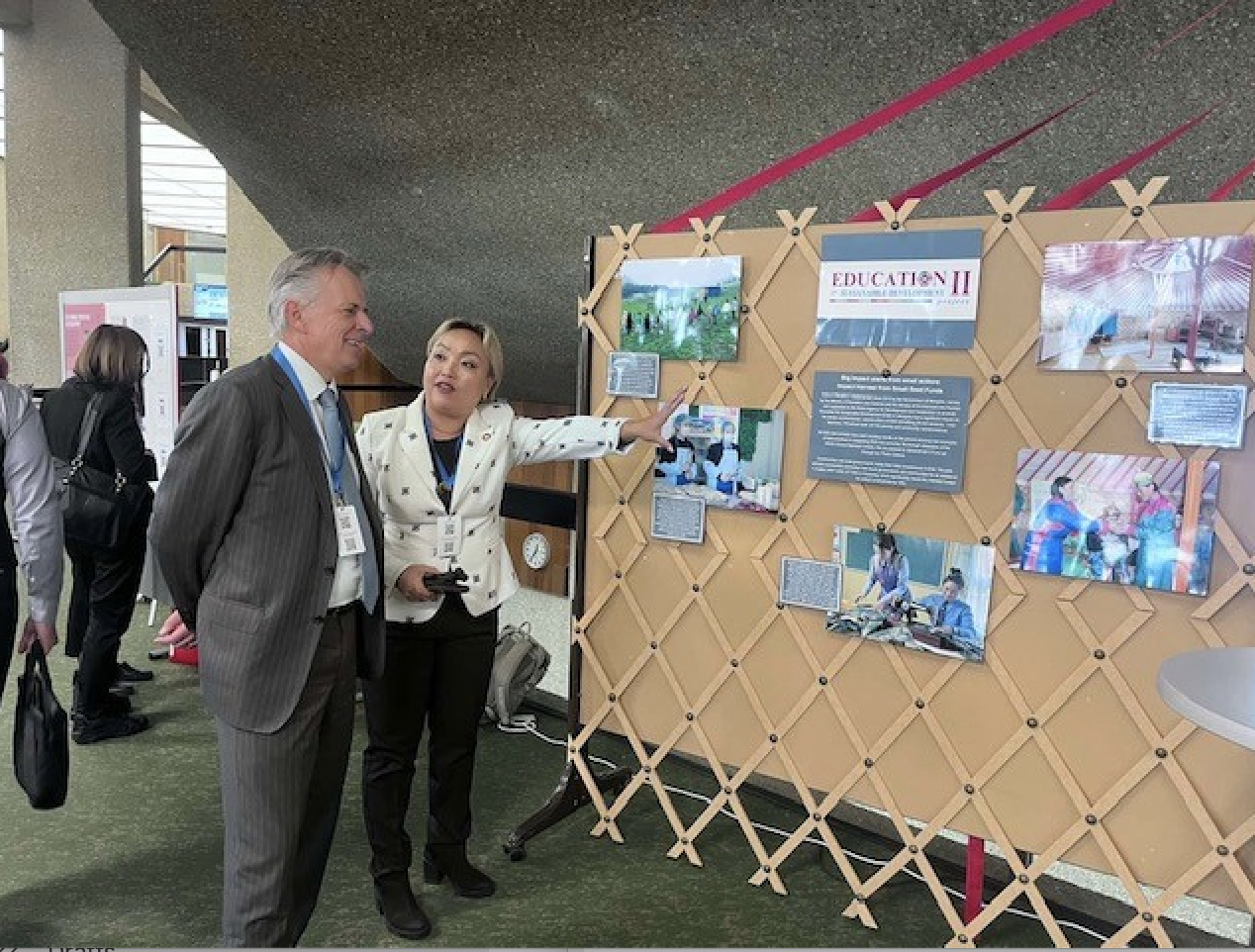
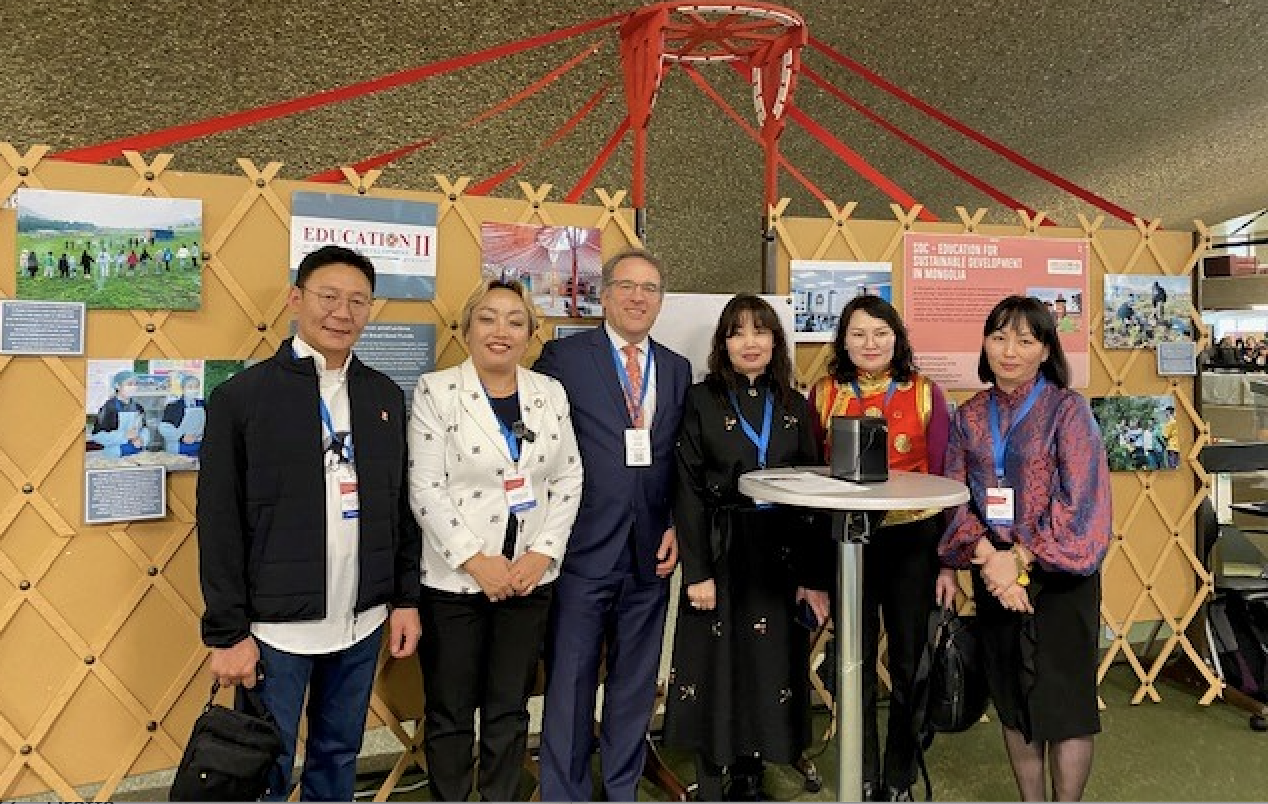
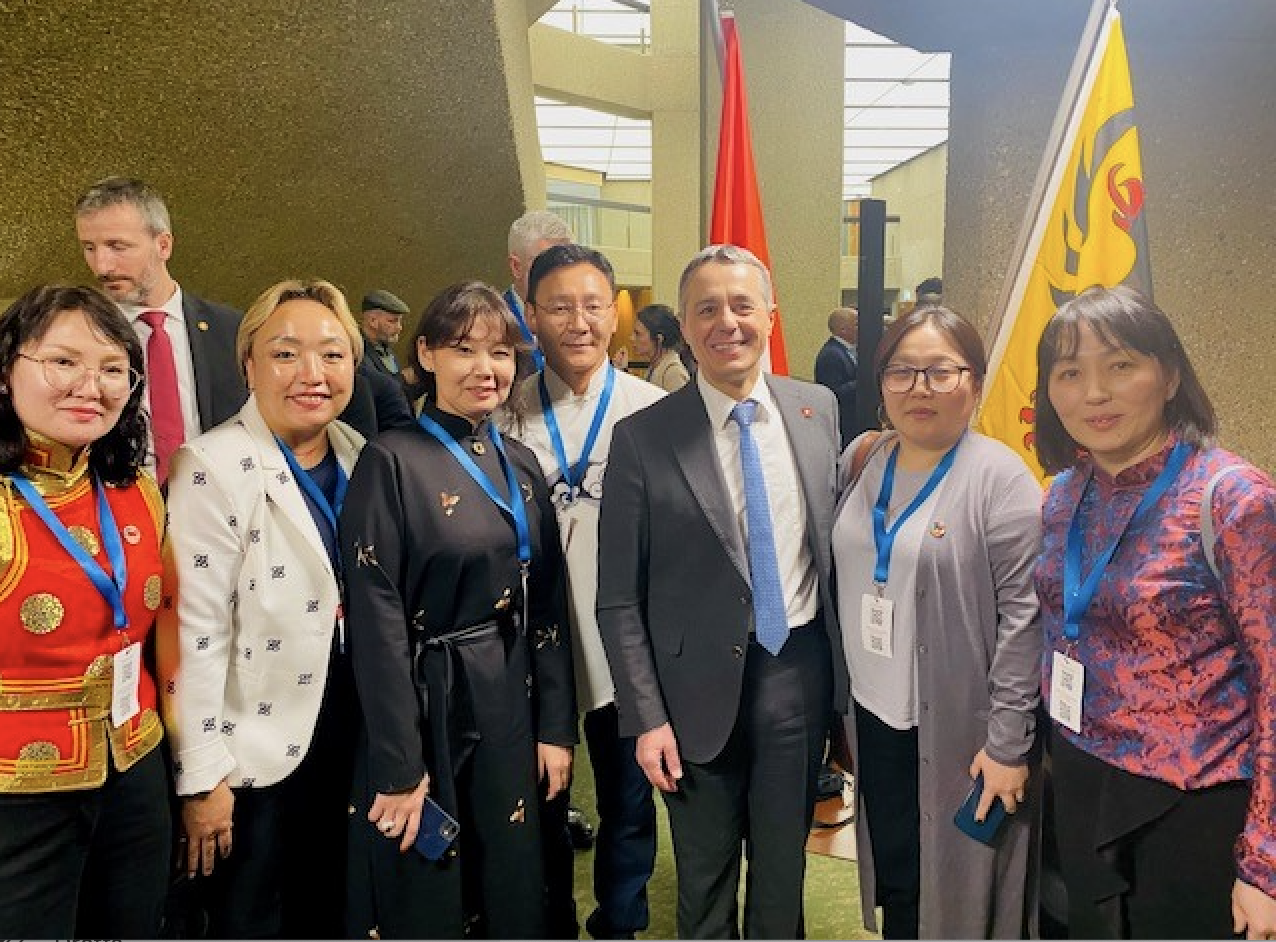
 14 March 2023
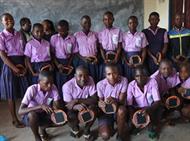
The BUILD Fund is a unique investment fund in support of small and medium-sized enterprises (SMEs) in least developed and lower middle income countries (LDCs and LMICs). Combining public and private investments, it will catalyse positive impact on the ground and contribute to achieve the SDGs.
Launched in 2020 and managed by Swiss-based Bamboo Capital Partners (BCP), the BUILD Fund provides growth capital to businesses identified, supported and nurtured by UNCDF. The overall objective of the BUILD Fund is to contribute to poverty alleviation, reduce gender inequalities and promote inclusive and sustainable economic growth. The BUILD Fund aims to invest in four sectors, namely 1) food security, nutrition, agribusiness; 2) financial inclusion and innovation; 3) green economy and renewable energy; 4) local infrastructure, and has a cross-cutting focus on youth and women’s economic empowerment. A key element of this is the economic advancement of women, particularly by supporting businesses owned or run by women. The BUILD Fund thus contributes to the achievement of various goals of the Swiss International Cooperation Strategy 2021–24.
Promoting inclusive and sustainable economic growth
In Zambia and Zimbabwe, as in many developing countries, SMEs face difficulties to meet their financial needs, despite their importance to the achievement of the SDGs and their contribution to economic growth. This constrains their productivity and survival. Blended finance should in principle address this underfunding, but although it is on the rise, only 6% of private finance mobilised by official development finance between 2012 and 2017 went to LDCs.
Switzerland will support the BUILD Fund with two separate but complementary investments: First, a direct investment of 5 million Swiss francs into the BUILD fund that can be deployed globally in those countries and sectors with the highest financing gap to achieve the 2030 Agenda. Second, an indirect investment of 9 million Swiss francs by way of a contribution to UNCDF, which will earmark the contribution to investments in Zambia and Zimbabwe. Finally, the SDC provides a 1 million Swiss francs to the BUILDER TA facility, which is closely involved in pipeline generation, portfolio building, and business advisory support to businesses.
Read here the full press release.
 14 March 2023
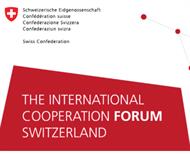
On February 15 and 16 over 1,000 representatives of the public, civic and private sector gathered virtually and physically in Geneva to discuss and co-create solutions to address the urgent financing gap to achieve global access to basic education for children and youth and therefore achieve SDG 4.
The urgency of for leveraging funding that goes beyond government sources became obvious, as the vast majority in a live poll highlighted "funding" as the most needed element to achieve SDG 4. At the same time, another poll showed that only 6% of the participants actually came from the private sector, which holds the strongest potential to provide financing for education.
Therefore, one of the four working sessions of the Forum was dedicated to present and discuss approaches and initiatives to use innovative finance instruments to mobilise funding for SDG 4. The session highlighted some important aspeects of innovative finance and presented concrete solutions, such as the Impact-Linked Fund for Education or a sustainable mutual fund initiated by the Zürcher Kantonalbank (ZKB) that would make fixed donations to Education Cannot Wait Fund from the UN.
The discussions showed, that the financial sector can play an important role in closing the financing gap for SDG 4: On the one hand, it is part of the core expertise of banks to provide investment solutions through their investment know-how and to generate returns that can be used to finance education. On the other hand, through their access to customers, they can make these investment vehicles available to investors interested in philanthropy.
 13 February 2023
This updated VSD Factsheet provides an overview of the opportunities and challenges in vocational education and training, SDC's approaches to promote vocational skills development in its projects, the partners , as well as project examples and facts and figures. Link to the factsheet
 19 December 2022
The call for applications for Swiss Re Foundation's Entrepreneurs for Resilience Awards 2023 is now open. The Entrepreneurs for Resilience Award recognizes entrepreneurial initiatives that take innovative approaches to build resilient societies in line with the United Nations Sustainable Development Goals. In the 2023 award cycle, the Swiss Re Foundation is looking to support innovative solutions that increase financial access to healthcare in low-income communities. To be eligible for the award, an enterprise must take a business-minded approach that increase the resources available to households to pay for healthcare or that reduces the risk of lasting economic vulnerability or poverty following an illness or accident. The three finalists will be awarded with funding up to USD 700 000 and non-financial support from experts across Swiss Re and beyond.
More details on the initiative and application form are available on the website here. |
 05 December 2022
The Swiss Guidance on Business and Human Rights is intended to help the Swiss Representations in the field to engage in a constructive dialogue with Swiss companies in order to raise awareness of human rights issues and provide specific advice in relation to the local context. The guidance has been sent to embassies and cooperation offices and is available online and as a hard copy brochure. It can be ordered (in E, F, D versions) from: sts.afm.mrd@eda.admin.ch Link to the document
 03 December 2022
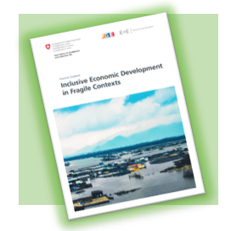
Responding to the voiced need for practical guidance for SDC staff and projects working in Inclusive Economic Development (IED) in fragile contexts a practical guidance note with examples from 9 SDC-funded projects, is now available on the shareweb. The practical guidance document adds to the already published slide deck and FAQ document that were produced with valuable inputs from network members, experts and other focal points.
 01 December 2022

The Public Entrepreneurship Academy equips practitioners from the public sector with the mind-set, tools and skills to implement the 2030 Agenda through impact-driven private sector engagement, collaboration and entrepreneurial action. To realise the UN Sustainable Development Goals in an environment of mounting complexity and uncertainty, there is an increasing need to build, leverage and scale partnerships across different sectors, involving public, private and civil society actors. The Public Entrepreneurship Academy is an immersive learning journey. Over the course of a half year, participants gain key knowledge in general management, entrepreneurship, agile co-creation, innovation and systems thinking. They learn while doing, integrating new ideas directly into their own work with the support of peers and individual coaching. They become part of a community of “public entrepreneurs", collaboratively defining how to realise impact-driven private sector engagement. NEW Registration deadline is December 10 2022. You'll find all the necessary information here: In case of questions: - Head of Executive Education at the Competence Center for Social Innovation at the University of St. Gallen: rachel.brooks@unisg.ch
- Contact person at the SDC's Competence Center for Private Sector Engagement (CEP): bernard.zaugg@eda.admin.ch .
Note for SDC staff: >As for other trainings, the costs for participating in the Public Entrepreneurship Academy can be covered by SDC / the FDFA. For SDC collaborators with Swiss contracts, at FDFA Head Office or in Swiss Embassies / Cooperation Offices, please follow the instructions that are available here: FDFA intranet / individual training programmes . For SDC collaborators with local contracts in Swiss Embassies / Cooperation, the process is as follows: - Get the approval from your Head of Mission (Head of Cooperation Office in case of absence of an Embassy in your country) and the “credit management unit" of your representation using this form . According to an agreement with FDFA Finance, Swiss Representations abroad that consider that the participation of one of their staff members to the Public Entrepreneurship Academy would be important in view of the further development of the International Cooperation programme might request a corresponding training budget within the Global Budget 2023, even if this leads to a substantial increase of the corresponding budget line in comparison to 2022.
- Register to the Public Entrepreneurship Academy.
- Once you've been accepted to the Public Entrepreneurship Academy, transmit the invoice to the financial responsible of your office that will pay the training fee directly.
For all SDC collaborators: it is the responsibility of your line manager to decide whether a repayment agreement shall be concluded for this training.
 17 November 2022
Village Capital with the support of its partners at the Impact-Linked Finance Fund, the Swiss Agency for Development and Cooperation and the Austrian Development Agency have launched the Catalyzing Financial Inclusion: Gender-Inclusive Fintech Solutions for Migrants report. This report shares insight on the financial inclusion obstacles disenfranchised migrant populations (especially women migrants) face in Saharan Africa, the Middle East and North Africa, and South and Southeast Asia – and highlights innovative, tech-driven solutions to these challenges. Link to the report
 11 October 2022
Four Case Studies about some of SDC’s innovative Private Sector Partnerships (PSE) were just published. They portray 1) Social Impact Incentives (SIINC), 2) Impact-Linked Finance Fund (ILFF), 3) Catalytic Market Facility Aceli Africa (Aceli), and 4) Product Development Partnerships (PDPs). The Case Studies provide an easy to read (and well-layouted) introduction to those projects and mechanisms and can also be shared outside of SDC.
 23 September 2022
In 2021, SCBF committed over CHF 1.36 million towards 13 new projects, attaining CHF 18.26 million in grant funding committed since inception. The projects SCBF co-funded touched a variety of themes: digital transformation for effective and efficient service delivery, micro-property insurance to enhance the resilience of MSMEs and low-income households, and innovative index-based insurance to enable vulnerable smallholder farmers and households to adapt in the face of an increasingly changing climate. Additionally, SCBF’s membership grew from 25 to 27, as SCBF had the pleasure to welcome AXA and the Basel Agency for Sustainable Energy (BASE). SDC is a strategic partner of SCBF. Click here for the report.
 25 August 2022
This report documents the evaluation of the Nepal Cooperation Strategy 2018-22 from the Swiss Agency for Development and Cooperation (SDC). The evaluation entailed a qualitative inquiry into the development effectiveness of the Cooperation Strategy. Its purpose was to inform the formulation of the new Nepal Cooperation Program 2023-26. The evaluation was conducted by two external evaluators and two SDC staff. Check ou the findings and recommendations for the bilateral inclusive economic development programmes in Nepal. It's a must read!
 05 July 2022

The Public Entrepreneurship Academy 2023 is now open for registration!
To realise the UN Sustainable Development Goals in an environment of mounting complexity and uncertainty, there is an increasing need to build, leverage and scale partnerships across different sectors, involving public, private and civil society actors.
The Public Entrepreneurship Academy equips practitioners from the public sector with the mind-set, tools and skills to implement the 2030 Agenda through impact-driven private sector engagement, collaboration and entrepreneurial action.
The Public Entrepreneurship Academy is an immersive learning journey. Over the course of a half year, participants gain key knowledge in general management, entrepreneurship, agile co-creation, innovation and systems thinking. They learn while doing, integrating new ideas directly into their own work with the support of peers and individual coaching. They become part of a community of “public entrepreneurs”, collaboratively defining how to realise impact-driven private sector engagement.
Registration deadline is October 30 2022. You’ll find all the necessary information here: CSI-HSG / PEA.
Internal note: As for other trainings, the costs for participating in the Public Entrepreneurship Academy can be covered by SDC / the FDFA.
For SDC collaborators with Swiss contracts, at FDFA Head Office or in Swiss Embassies / Cooperation Offices, please follow the instructions that are available here: FDFA intranet / individual training programmes.
For SDC collaborators with local contracts in Swiss Embassies / Cooperation, the process is as follows: 1. Get the approval from your Head of Mission (Head of Cooperation Office in case of absence of an Embassy in your country) and the “credit management unit” of your representation using this form. According to an agreement with FDFA Finance, Swiss Representations abroad that consider that the participation of one of their staff members to the Public Entrepreneurship Academy would be important in view of the further development of the International Cooperation programme might request a corresponding training budget within the Global Budget 2023, even if this leads to a substantial increase of the corresponding budget line in comparison to 2022. 2. Register to the Public Entrepreneurship Academy. 3. Once you’ve been accepted to the Public Entrepreneurship Academy, transmit the invoice to the financial responsible of your office that will pay the training fee directly.
For all SDC collaborators: it is the responsibility of your line manager to decide whether a repayment agreement shall be concluded for this training.
In case of questions: Head of Executive Education at the Competence Center for Social Innovation at the University of St.-Gallen: rachel.brooks@unisg.ch. Contact person at the SDC’s Competence Center for Private Sector Engagement (CEP): bernard.zaugg@eda.admin.ch.
 22 June 2022

With the lab of tomorrow #14, the CSI-HSG co-initiated the first edition of the lot for the Swiss development context in cooperation with the Swiss Agency for Development and Cooperation (SDC). The lot 14 tackles challenges related to the food system in Rwanda. Based on in-depth research and needs finding, people from different sectors and backgrounds co-created innovative solutions in an Innovation Sprint built around design thinking. During the current incubation phase the teams receive coaching, to further develop their solutions with the aim to finally implement them and create impact. The CSI-HSG implements the project in collaboration with multiple partners, including SDC, GIZ, Nestlé, Impact Hub Kigali and reverse. The lab of tomorrow (lot) is an open multistakeholder innovation process to develop entrepreneurial solutions to global challenges and is therefore also an incubator for impact-driven business activities and cross-sector partnerships. By bringing together people with different backgrounds and expertise and jointly creating new solutions for the big challenges of our time, the lot has a huge potential for transformation. The aim is to foster co-creation of social innovations that contribute to the SDGs and systemic change. The lot format was developed by the Deutsche Gesellschaft für Internationale Zusammenarbeit (GIZ) on behalf of the Bundesministerium für wirtschaftliche Zusammenarbeit und Entwicklung (BMZ) and has a proven track record of eleven completed processes and over 50 business model sketches created and many of them implemented.
 02 June 2022
Thursday, June 16th 2022 / 1:00pm-2:30pm CEST (online). For the almost 300 million migrants worldwide, financial products such as savings, credit, insurance, or pension are seldom easily accessible. This Savings & Credit Forum discusses the incentives of the private sector to ensure migrants' financial inclusion and showcases innovative modalities to reach women and other particularly vulnerable migrant groups. >> more information
 01 June 2022
This Information Package is designed for SDC staff and practitioners involved in inclusive economic development (IED) programmes. It provides an introduction into the IED approaches and ways of systemic thinking through three interlinked economic thematic priorities on system and individual level: Vocational Skills Development (VSD), Private Sector Development (PSD) and Financial Sector Development (FSD), and the modality of private sector engagement (PSE). Updated version April 2022 - An easy to read introduction for a quick overview of the topic IED
 21 March 2022

SDC’s PSE portfolio is diverse and growing. With the latest Annex 2 data, we can for the first time estimate private sector contributions leveraged by SDC’s funds. Thanks to triangulating SAP data with information provided by operational entities at the head office and in the field during the Annual Report process through the Annex 2, we are able to get a better overview of SDC’s PSE portfolio. While many data challenges remain, the following summary provides a snapshot of the status of SDC’s PSE portfolio at the end of 2021: - SDC has currently 142 recorded PSE projects with a total of 162 partnerships (some projects have more than one PSE partnership). The number of projects and partnerships is increasing overall, however it’s diffcult to qualify this trend, as this is only the second year for which this data was collected and it depends on what is recorded as a PSE partnership by operational units.
- Roughly half (70 of 142) of SDC’s PSE projects are in the South Cooperation Domain, followed by 52 in the Global Cooperation Domain, 14 in the East Cooperation Domain and 6 in the Humanitarian Aid Domain.
- In terms of financial volume, projects totalling an amount of CHF 900 mio. (only SDC’s committed funds) include a PSE partnership. It is important to note that many of these projects have only a small PSE component.
- The health sector is the sector with the highest volume of SDC funds engaged in partnerships with the private sector, accounting for 44% of SDC funds in PSEs. The main driver are large multi-stakeholder initatives that pool public and private funding such as the Global Fund to fight HIV, TB and malaria.
- The biggest number of PSE partnerships, 43 out of 162, are in the area of Employment +Income, followed by Health (28) and Food Security and Nutrition (24).
- Multi-stakeholder Partnerships – comprising various public and private actors – represent the most important PSE Format, accounting for almost two thirds of SDC’s PSE partnerships.
- Financial market oriented PSE Formats aiming at leveraging private sector money such as venture investments, Social Impact Incentives (SIINC), or impact-linked finance schemes are a small but growing share of the SDC’s PSE Portfolio.
- For the first time ever, the data allows for a (rough) estimate of the private sector funds leveraged in PSEs SDC is participating. Across all of SDC’s PSE portfolio the funds comited by SDC accounts for 2.6% of total funds; that of other public partners 85.5%; and private sector contributions 11.9%.
- This translates into a leverage ratio (mobilisation of private funds through public funds) of roughly 1:4 for SDC’s contribution, but only 9:1 if all public contributions are taken into account. It is important to note that only few SDC PSE partnerships are designed with the specific goal to leverage private funding
Along with the development of capacity building offers, the establishment of a new PSE risk management process, as well as a series of tools / instruments for different PSE formats, consistently improving our data to better capture our PSE portfolio is a priority of the CEP. This will allow better strategic decision making and operational choices and help moving PSE forward. If you are interested in more details about SDC’s PSE data you can find all data on the shareweb. Many thanks to all of you who contributed to this effort! Download here some cool graphs and charts bringing Annex 2 to Life:
Annex 2 Graphs.pdf
 10 September 2019
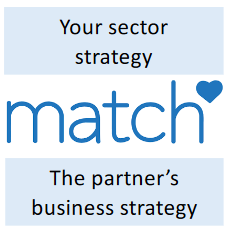
![]() We all know that collaboration with private companies is key in making market systems more inclusive. At the same time, it is challenging to find the “right” partners, negotiate deals with them, know what we should and what we shouldn’t pay for, etc. The e+i network provides you with a concise and practical summary of the most important lessons learned by experienced practitioners in Market Systems Development (MSD) on how to form partnerships with the private sector. The lessons are complemented by a concrete case from the PRISMA project partnering with businesses in the maize sector. We all know that collaboration with private companies is key in making market systems more inclusive. At the same time, it is challenging to find the “right” partners, negotiate deals with them, know what we should and what we shouldn’t pay for, etc. The e+i network provides you with a concise and practical summary of the most important lessons learned by experienced practitioners in Market Systems Development (MSD) on how to form partnerships with the private sector. The lessons are complemented by a concrete case from the PRISMA project partnering with businesses in the maize sector.
Download the nicely illustrated summary of lessons learned here. Webinar: On 30th October 2019 at 12:00 noon Swiss time (see different time zone below), Hans Posthumus will be interviewing experienced programme managers for their top tips on how to collaborate with private companies in the context of MSD programs. Please join us for this webinar on Oct 30th registering here. add event to my calendar here
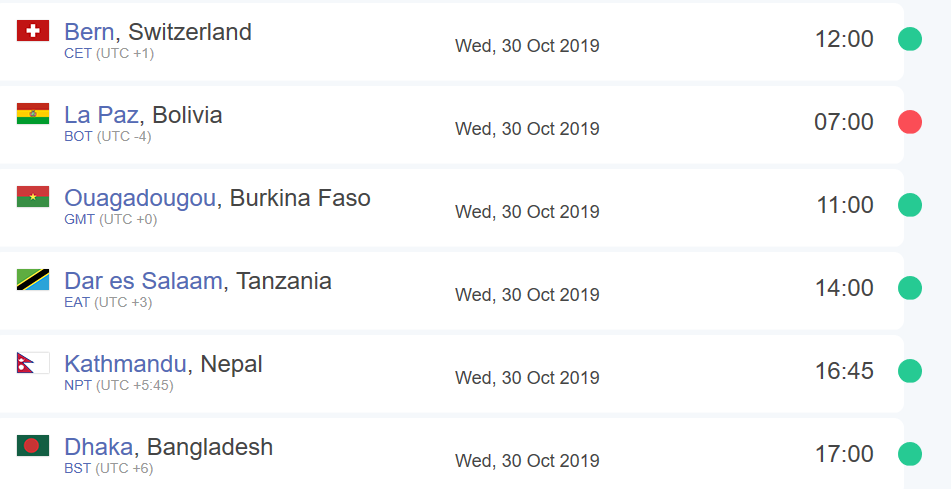
![]()
![]()
Your city is not in the list? Convert to your time zone here.
 17 June 2019
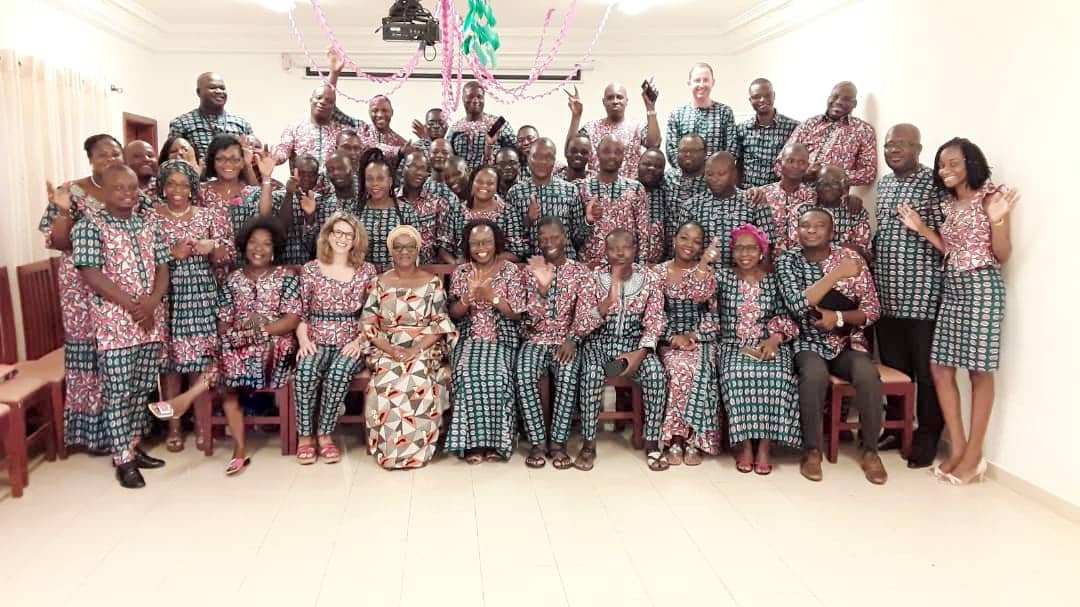
The engagement with the private sector (EPS) is one of the cornerstones of SDC. The ultimate EPS goal is to create win-win situations between the private and public sector, to mobilize additional resources from the private sector to tackle global challenges and achieve the SDGs. Within SDC, many cooperation offices have started designing their EPS strategy and have implemented successfully projects with private sector partners. During the SDC e + i F2F this May in Solothurn, colleagues from the SDC office in Benin shared their first vision regarding EPS in the Western African country. The country’s private sector is characterized by a high share of informal employment, difficult business environment (Benin ranks 155th out of 190 countries in the World Bank Doing Business Index) and low financial access for SMEs. While the cooperation office’s initiatives in the past have been rightly focused on private sector development (PSD) during the F2F EPS clinic, conclusions from past initiatives and possible next steps were discussed. The general idea is to build up on relations and insights from PSD projects and move it towards a more “engagement” part. This means that the private sector and the SDC co-initiate, co-pilot and co-finance projects. The current major step concerns Vocational Training, as negotiations along EPS principles have started with an umbrella organization of big industrial enterprises, within the new project “Formation professionnelle et Renforcement de Capacités pour l’Emploi (FORCE)”. Other smaller attempts are being made within existing projects. The projects can take several forms (e.g. single or multi-stakeholder projects). If done successfully, this would allow the SDC cooperation office in Benin to mobilize additional resources, ensure that solutions developed sustain in the long-term and develop a new skill set for the future. According to the colleagues in Benin, another important step would be to conduct an multi-day EPS100 workshop, which showcases the fundamentals when it comes to engage with the private sector and would also allow for a sophistication of the EPS strategy. The EPS100 workshop is available for all cooperation offices, which would like to follow the path of Benin and enter into the exciting world of engagement with the private sector. It includes an overview of the private sector actors, the detailed explanation of each format a project can take and the development of a country-specific list of possible projects. Interested cooperation offices can contact the EPS team on their sharweb site or consult the EPS100 workshop one pager.
 29 August 2018
SAVE THE DATE: 6 May To 9 May 2019 The Focal Points e+i and CEP kindly invite all interested SDC Staff from the thematic areas of Vocational Skills Development, Private Sector Development, Financial Sector Development as well as Engaging with the Private Sector to join us for a better understanding on engaging with the private sector in the employment and income area, by bringing together two priorities of the 2017-2020 Dispatch on International Cooperation... [more]
 02 July 2018
On July 13, the Center for Universal Education at Brookings invites you to a public event in Washington D.C. to join the partners of the world’s first development impact bond (DIB) in education for a discussion of the results and learnings from the final year of the program. The impact bond provides financing for Educate Girls, a non-profit that aims to increase enrollment for out-of-school girls and improve learning outcomes for girls and boys in Rajasthan, India. The UBS Optimus Foundation has provided upfront risk capital to Educate Girls and, contingent on program targets being met, will be paid back their principal plus a return by the Children's Investment Fund Foundation. Other partners involved are Instiglio, a non-profit impact bond and results-based financing intermediary organization, which provided performance management assistance to Educate Girls and ID Insight, a non-profit evaluation firm that assessed the improvement in learning and validated the number of out-of-school girls enrolled. The event will explore the experiences of the key stakeholders, the overall learnings, and potential recommendations for those considering engaging in this innovative financing mechanism. In what promises to be a lively debate, the partners will share both successes and challenges of the model in order to contribute to the evidence on when, and how, it can be most effective. For further background on impact bonds in developing countries, please see the Center for Universal Education’s report. This event will also be webcast live – so if you are unable to join us in D.C., please consider participating online. #EducateGirls
 26 June 2018
In November 2017, the EOF set out with the ambitious goal of designing a $1 billion outcomes fund to drive quality education in Africa and the Middle East. Since then great progress on key elements of the overall design was made including: - Identifying which countries have greatest potential for our first pilot funds
- Creating a set of funding models for EOF and a framework for assessing the suitability of non-state service providers to outcomes funding
- Establishing a draft design for the EOF operating model and governance structure
- Building key relationships in government, civil society, and the private sector
Looking ahead, the next phase of work will shift focus towards laying the groundwork for implementation. This will involve developing detailed program designs in a number of countries, continuing our cross-sector engagement, and beginning to secure the first commitments to the Fund. Fore more information, click here.
 26 June 2018
The 2018 Annual Meeting was hosted by the MasterCard Foundation in Toronto, Canada, 5-8 June. The Thematic Day was on the theme “Youth Employment in a Changing World: Implications for Private Sector Development”. Minutes for the Annual Meeting will be posted here in due course, once agreed. Minutes for the individual Working Group Meetings will be posted on the respective WG pages, once agreed. SDC steers the working groups on "Result Measurement" and the one on "Engaging with the Private Sector".
 16 March 2018
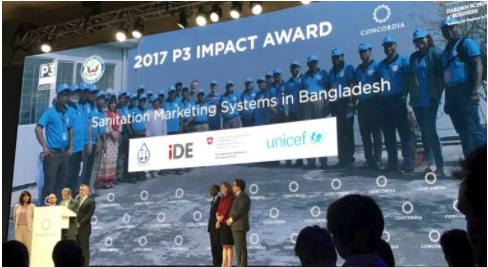
The Sanitation Marketing Systems in Bangladesh (SanMarkS) has recently been awarded the prestigious P3 Impact Award for its public-private partnership (P3) approach.
SanMarkS applies Sanitation Marketing, Market Systems Thinking, and Human Centered Design to reach 450,000 poor and disadvantaged rural people by 2019 with better health and wellbeing through improved sanitation. The project began in November 2015 and is jointly funded by SDC and UNICEF and implemented by iDE-Bangladesh.
SanMarkS aims to build household demand and private sector supply of hygienic, affordable latrines by facilitating collaboration between national level manufacturers of latrine parts, local level entrepreneurs, municipalities and the Department of Public Health Engineering. The project promotes the integration of the private sector as a key stakeholder into the existing public and civil society platforms in the sanitation sector in rural areas.
SanMarkS builds the capacity of local latrine producers, their knowledge and technical know-how as well as market promotion strategies to increase their client base.
As a result, (341) local entrepreneurs are now organized. They have formed business associations (sanitary business associations SBA) to leverage their collective skills and buying power. This enables remote customers in villages to access hygienic latrines at affordable prices, while latrine producers who are a part of a business association have seen their sales of hygienic latrines almost double. The local government subsidies to help poor households build latrines are now used more effectively, as the local latrine producers deliver cheaper and more hygienic latrines. The sanitary business associations enforce quality standards among the members and have begun engaging with the local government to create national quality standards for improved latrines. National manufacturers are able to reach new customers who were inaccessible before due to the high cost and logistical challenges of marketing in remote areas. By engaging with a single point of contact from a business association representing several entrepreneurs, companies now have a simple and cost-effective way to distribute their products in sparsely populated rural regions. In this way, SanMarkS builds capacity of the private sector actors to develop products, messages and marketing techniques that will reach specific types of consumers based on household income, assets, lifestyles and other characteristics resulting in better health condi¬tions and well-being.
Interested to learn more?
 19 September 2017
Dear Energy Entrepreneur,
The Swiss Re Foundation Entrepreneurs for Resilience Award recognises
exceptional entrepreneurial initiatives that contribute to building resilient
societies. The 2018 Award focuses on innovative solutions that put renewables
to work in low-income communities. Given your impact, focus and performance, we
believe your organization fits well with the objectives and requirements of the
Award and would like to actively encourage you to apply.
Further information is available in the appendix or on the award webpage.
Applications will be accepted until 30 September 2017. Please go ahead and
apply on time!
If you have questions, you are welcome to contact us at info@lefilconsulting.com. LeFil has
been entrusted to facilitate the application and selection process.
 11 September 2017
The e+i Focal Point has developed five glossaries with key terms for Private Sector Development (PSD), Financial Sector Development (FSD), Systemic Change (MSD/M4P), Vocational Skills Development (VSD) and Monitoring and Results Measurement (MRM). The documents will help us to understand each other better until we rely completely on intelligent algorithms like the
DeepL Translator. Below we listed some of the highly used terms in the respective fields. Do you have the same understanding of the terms as we do? Feedback is highly appreciated.
 12 June 2017
Accelerate2030 has
launched its second edition! Impact Hub, UNDP and partners are joining forces
to support and promote the most promising impact-driven ventures across the
globe who focus on tackling the SDGs and are ready to scale. Read more here. finalists will
receive customized support for 9 months and and a chance to present their
company at the Social Good Summit this October in Geneva, Switzerland.
Apply here by 18th June! Check out their short video here.
 26 May 2017
A call to action to business leaders to align with the SDGs. This report by the Business and Sustainable Development Comission shows how the next decade will be critical for companies to open 60 key market "hot spots", tackle social, environmental challenges, and re-build trust with society. Find the executive summary of this report here.
 18 May 2017
Technology innovation can be a great enabler for development in low and middle-income countries. This course presents a methodology and an approach to develop impactful innovations that have the power to foster sustainable development. This course is not just about coming up with a nice idea, or designing a nice prototype, but more importantly, about sustainably deploying it at large scale.It fosters an entrepreneurial approach, as you will learn how to design business models that are relevant to address development-related challenges. It encourages co-creating the solution with the key stakeholders involved, including the affected populations. Whether you are from an industrialized or a developing country, whether you are employed in a company, an NGO, an international organization or a government. Whether you are an academic, an independent entrepreneur, or simply a passionate individual, this course is for you. You will learn how, as an innovator, you can help solve important issues that burden those living in poverty. For more information, click here or watch the video teaser.
 28 November 2016

The Swiss Capacity Building Facility (SCBF) is a public-private development partnership dedicated to improving the lives and livelihoods of low-income people and micro-entrepreneurs in developing and emerging economies. It is a grant-making organisation with the objective to promote financial inclusion as a strategy for alleviating poverty. SCBF currently unites 18 Switzerland-based member organisations, including SDC as the public partner and core funder. The members greatly contribute through their expertise, ensuring SCBF stays focused and selects high-impact projects for capacity building support. This creates a unique partnership working to help partner financial institutions to enhance their outreach to financially excluded populations, as part of social and economic development work.
Project highlights in September & October 2016 Approved projects Product up-scaling: Strengthening outreach to rural clients with e-wallets by FINCA Haiti: Integrating disbursements and improving delivery channels structure
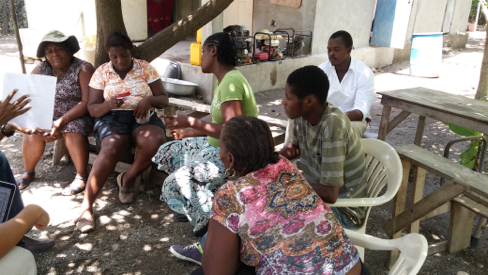 Caption for the attached image: “A group of agricultural loan clients in Gros-Morne (Artibonite) in Haiti, about an hour inland from the FINCA branch on a dirt road. These clients repay their loans using mobile money.”
There are also several projects in the pipeline in Kenya, Colombia, Zambia, Ivory Coast, and the Democratic Republic of Congo.
Closed projects
Product up-scaling: CIH Bank in Morocco – Downscaling to target small enterprises.
 07 September 2016
 23 March 2016

The SCBF is SDC’s major public-private development partnership with the Swiss financial sector to promote financial inclusion in the South. Activities under management since inception in 2011: 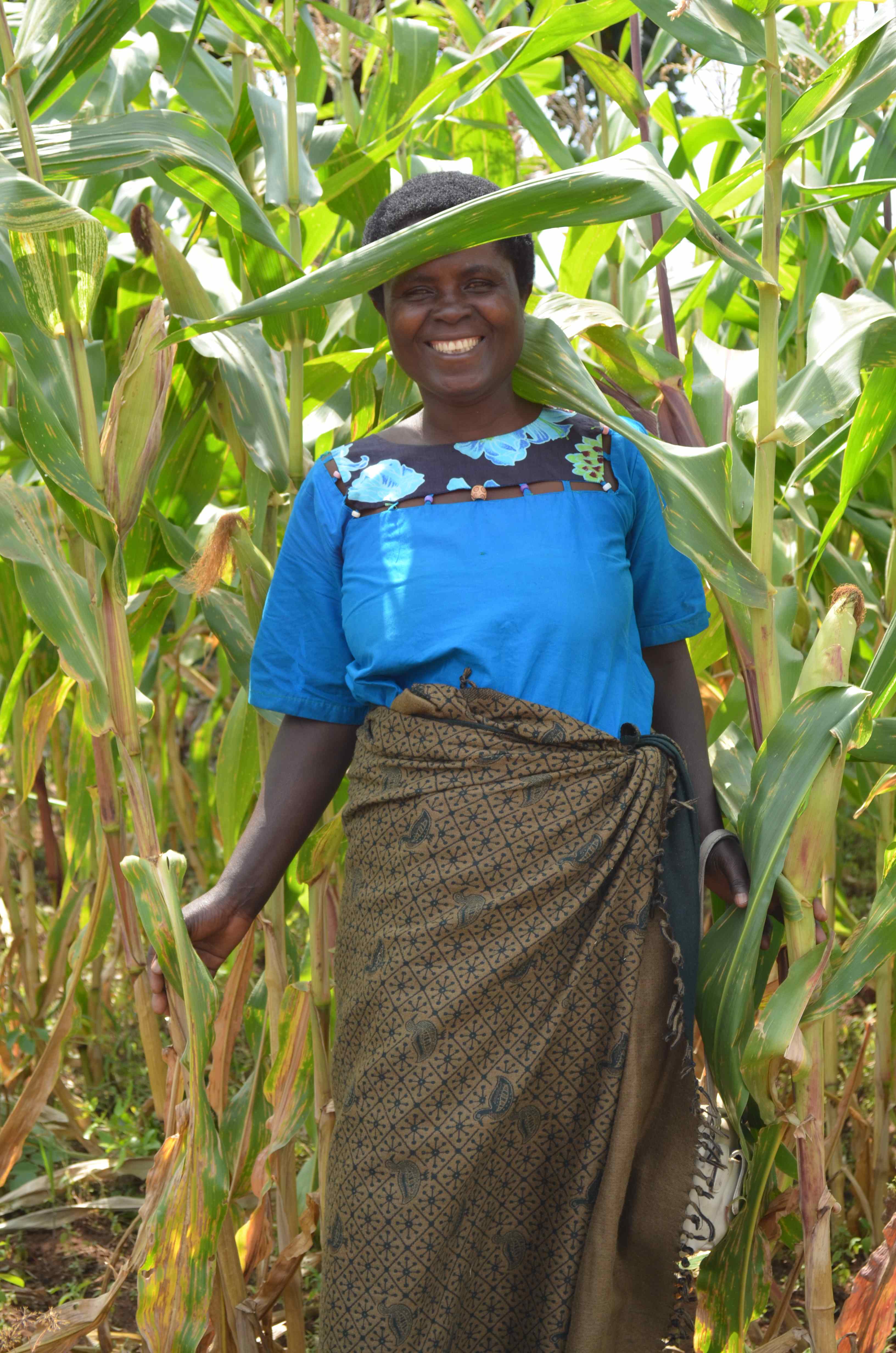 Product Up-scaling interventions: Approved interventions: 56 / Overall volume: CHF 11.80 mio / Approved SCBF contributions: CHF 7.00 mio / Self-contribution by partner financial intermediaries and third parties: CHF 4.8 mio (41%) Product Up-scaling interventions: Approved interventions: 56 / Overall volume: CHF 11.80 mio / Approved SCBF contributions: CHF 7.00 mio / Self-contribution by partner financial intermediaries and third parties: CHF 4.8 mio (41%)
Feasibility Studies: Approved studies: 15 / Overall volume: CHF 2.15 mio / Approved SCBF contributions: CHF 1.39 mio / Self-contribution by partner financial intermediaries and third parties: CHF 0.76 mio (avg 35%) Financial Education Campaigns: Approved campaigns: 9 / Overall volume: CHF 1.92 mio / Approved SCBF contributions: CHF 1.13 mio / Self-contribution by partner financial intermediaries and third parties CHF 0.79 mio. (avg 41%) Highlights since the last newsletter: Myanmar: SME lending
Mexico: digital payment platform
Zimbabwe: microinsurance greenfielding
Myanmar: microinsurance claims optimization
Mexico: digital ROSCA platform
 30 November 2015
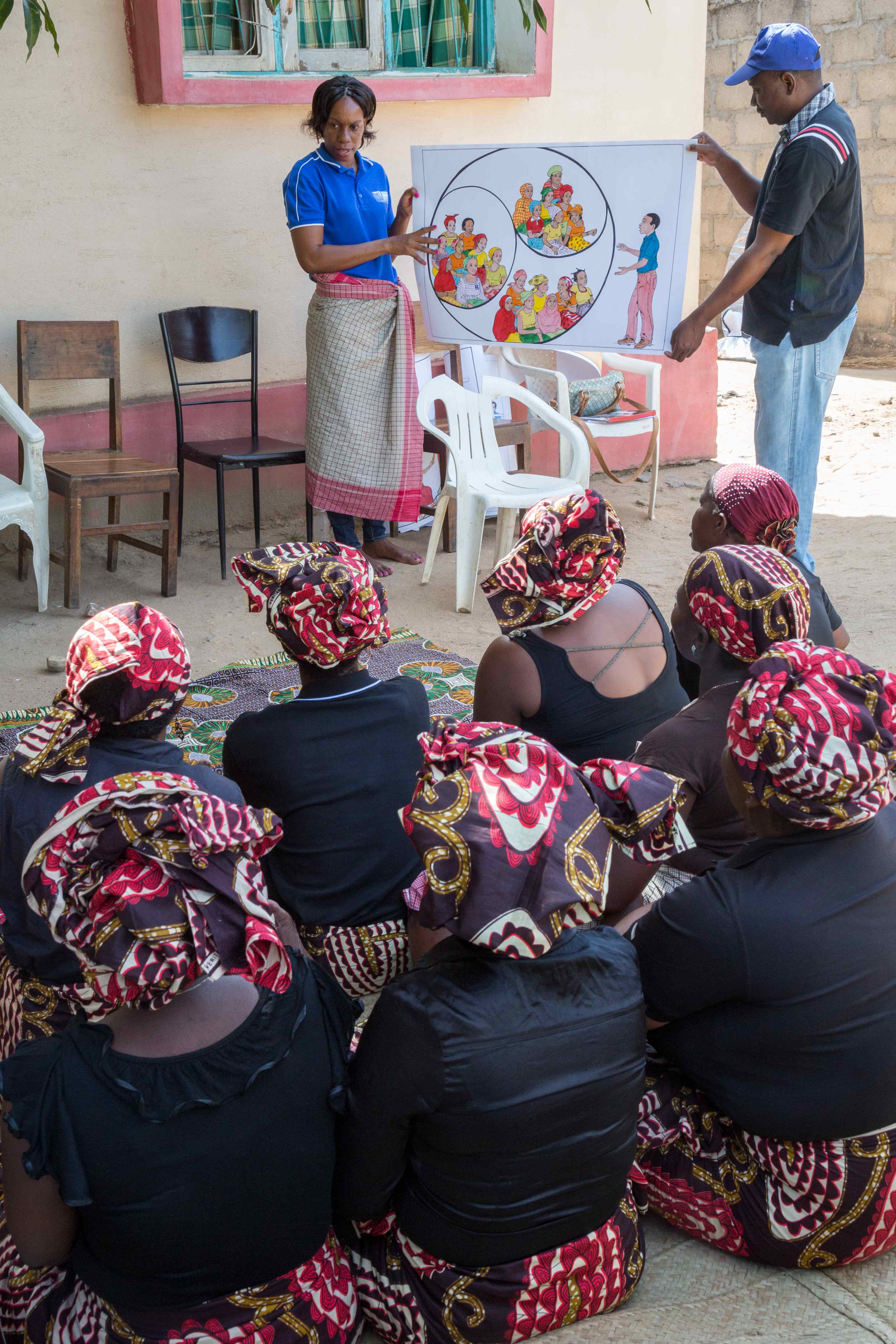 SDC Mozambique private and financial sector domain aims at improving access to finance. Since 2012, SDC has supported an innovative private public partnership to create a rural green-fielding institution called Microbanco Fides Moçambique SA (MBFM) whose technical assistance is provided by Financial Systems Development Services (FIDES). In this context of the PPDP, Swiss Microfinance Holding (SMH) acted as the private sector investor. MBFM is a formally licensed micro bank under the prudential regulation and supervision of central bank. The partnership between SDC, FIDES and SMH was designed to leverage scarce public resources and to reach 15’000 poor clients that could not be targeted through a standard project. In addition to MBFM, and as part of the project, an Inclusive Finance and Insurance Academy (INFINA) was established to train young Mozambican to staff MBFM. SDC is represented by the COOF at MBFM board of Directors. >> more
 03 September 2015

The SCBF is SDC’s major public-private development partnership with the Swiss financial sector to promote financial inclusion in the South.
Activities under management since inception in 2011:
Product Up-scaling interventions: Approved interventions: 50 / Overall volume: CHF 10.5 mio / Approved SCBF contributions: CHF 6.4 mio / Self-contribution by partner financial intermediaries and third parties: CHF 4.2 mio (36%)
Feasibility Studies: Approved studies: 13 / Overall volume: CHF 1.8 mio / Approved SCBF contributions: CHF 1.3 mio / Self-contribution by partner financial intermediaries and third parties: CHF 0.5 mio (30%)
Financial Education Campaigns: Approved campaigns: 8 / Overall volume: CHF 1.7 mio / Approved SCBF contributions: CHF 1 mio / Self-contribution by partner financial intermediaries and third parties: CHF 0.7 (40%)
Highlights: Completion of product up-scaling interventions in Palestine, Honduras, El Salvador/Honduras, Guatemala and Nepal. Multiple interventions are currently in the pipeline for fall. You might also want to have a look at the Annual Report 2014.
Relevant Events
-
29 Apr 2024
-
01 Apr 2024
online
-
23 Jan 2024
-
09 Oct 2023
Bangkok, Thailand
-
04 Oct 2023
-
02 Oct 2023
-
26 Sep 2023
-
19 Sep 2023
-
06 Sep 2023
Zurich, Switzerland
-
03 Jul 2023
Hotel Grenzfall, Berlin, Germany
-
22 Jun 2023
-
15 Jun 2023
-
21 Mar 2023
Online
-
27 Feb 2023
ETH Zürich
-
13 Feb 2023
Switzerland/online
-
12 Jan 2023
-
23 Nov 2022
Berne / online
-
14 Jun 2022
Zuerich
29 Apr 2024
29 April 2024
29 April 2024
29 April
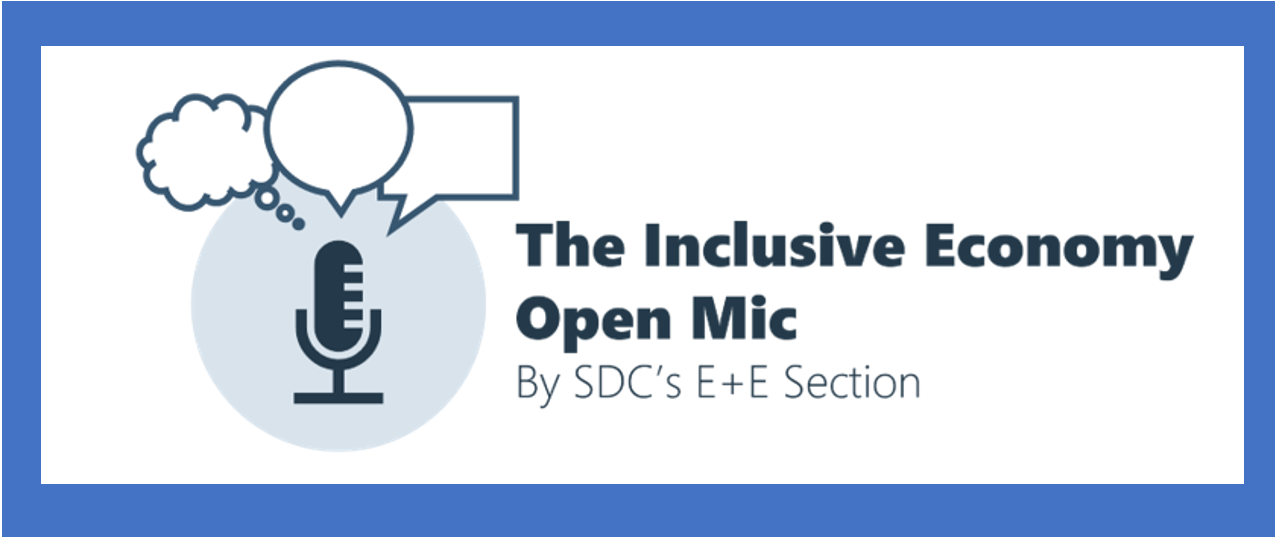 We are excited to invite you to the second edition of our Inclusive Economy Open Mic🎤 series! For those who could not take part in the first Open Mic, this is a new platform of the E+E Economy Network designed to bring us together in an informal setting. It's not just about showcasing our "final" products, but also about learning, sharing updates, understanding how others tackle projects, and gaining insights from various processes. We are excited to invite you to the second edition of our Inclusive Economy Open Mic🎤 series! For those who could not take part in the first Open Mic, this is a new platform of the E+E Economy Network designed to bring us together in an informal setting. It's not just about showcasing our "final" products, but also about learning, sharing updates, understanding how others tackle projects, and gaining insights from various processes.
We have an exciting lineup for our #2 Open Mic: - Spotlight on Frédérique Weyer, SDC's Regional Thematic Advisor for PSE and Food Secturity, based in Nairobi. We will hear from her about her work and she will present us the key priorities and challenges for SDC’s PSE / PSD work in Africa.
- A casual networking session for catching up informally.
- A news reel featuring updates on ongoing projects, upcoming events, publications, and changes. Share your news by emailing us at nadia.bucher@eda.admin.ch by April 22, 2024, and we'll showcase it in a dedicated slide.
- "Work out loud [WOL]" moment: Feel free to spontaneously share what you're currently working on, your work in progress, or any updates you'd like to share. Let's make it an interactive and engaging session!
Join us at the Inclusive Economy Open Mic 🌐- let's come together informally, share exciting insights, exchange news, and spark ideas. Save the date: Monday, 29 April 2024, 09:30 – 10:15 am CET (Bern-time).
Access: Join Zoom Meeting https://us02web.zoom.us/j/85718415672 Meeting ID: 857 1841 5672
See you online! And remember: send us your item for the “news reel” to be featured (see bullet point above). Luca Etter PSE Focal Point, E+E Section Nadia Bucher Academic Trainee, E+E Section
01 Apr 2024 in online
01 April to 02 July 2024
01 April to 02 July 2024
in online
01 April in online
Looking to collaborate effectively with the private sector? We are pleased to announce the return of the Online Course in Private Sector Engagement (PSE) in April and June 2024. This program offers an in-depth examination of essential PSE concepts, a broad survey of key private sector stakeholders, and an exploration of the primary modalities of engagement. Additionally, the course provides an opportunity for direct interaction with the Competence Center for Private Sector Engagement (CEP) team, who are available to address your questions or concerns regarding PSE practices and policies. All information and registration here.
23 Jan 2024
23 January 2024
23 January 2024
23 January

In continuation of our BarCamp series on the role of dual VET in a just green transition, the DC dVET is inviting to the next BarCamp. For the organization of these BarCamps they newly collaborate with a Committee of Interest (COI) composed by representatives of the Austrian Labour Market Service Niederösterreich (AMS), GIZ, Helvetas, Swisscontact and the VET Toolbox. This 2nd BarCamp will serve as interactive platform to discuss and exchange on parameters for a successful inclusion and collaboration with the business sector: The role of the business sector in dual VET for a just green transition
Tuesday, 23rd January 2024, 12:00 – 2:00pm CET The program includes: · Keynote speech: Let’s hear from a representative of the business sector on the motivation to invest in green skills for a just transition and how the intersection between sustainability and VET as well as the Environment, Social and Governance (ESG) approach can foster dual VET in a just green transition. · Exchange Sessions: Let’s bring in your own experiences and discuss them with others - join one of the sessions and discuss your perspective with business representatives and projects addressing the nexus of VET and just green transition. If you want to host your own session, please indicate this in the registration form – we are here to support you. Please register here: here
09 Oct 2023 in Bangkok, Thailand
09 October to 13 October 2023
09 October to 13 October 2023
in Bangkok, Thailand
09 October in Bangkok, Thailand

The bi-annual training workshop has gained a reputation for empowering the practitioners who are driving the field forward to meet new and on-going challenges in results measurement for improved management, greater accountability and better results. This year's workshop will be in-person in Bangkok. It will bring together experienced results measurement practitioners for five focused days of learning practical approaches, sharing challenges and tips and contributing lessons to the field. The main theme of the workshop this year will be assessing system change including dimensions of system change particularly relevant to PSD programs today. Link to the flyer.
04 Oct 2023
04 October to 12 October 2023
04 October to 12 October 2023
04 October
Join us at the GIIN Impact Forum, the premier global gathering of impact investors. The GIIN Impact Forum is a global impact investing event with unparalleled networking, thought-provoking speakers, interactive sessions, and a diverse range of impact investing leaders from six continents. With a reputation for fostering valuable connections and providing a platform for sharing innovative strategies and industry developments, this is an opportunity you can't afford to miss. Learn more about the GIIN Impact Forum here
02 Oct 2023
02 October 2023
02 October 2023
02 October
Looking to collaborate effectively with the private sector? The Online PSE Basic Course is back! Familiarize yourself with key PSE terminologies, explore the diverse range of private sector actors, and uncover the primary engagement formats. Equip yourself with PSE's guiding principles, resources, and tools. Plus, meet the CEP team and grab the chance to clarify any PSE-related queries. More information and registration here.
26 Sep 2023
26 September 2023
26 September 2023
26 September
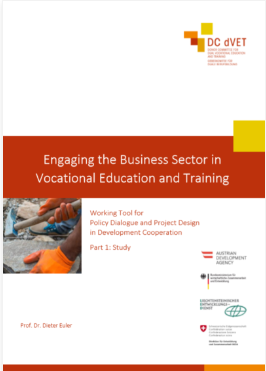
Engaging with the business sector remains one of the recurring challenges in dual VET. In their upcoming webinar & subsquent expert consultation DC dVET provides the opportunity to engage with Prof. em. Dr. Dieter Euler, one of the leading experts in this field Webinar (19 September 2023, 12:00 – 1:00pm CET): Prof. Euler who is the author of the DC dVET working tool on engaging the business sector will provide an input on the essential needs for effective cooperation with the business sector and on particularly relevant framework conditions. In his input Prof. Euler will also refer to his latest research which will be published in November 2023 “Roadmap to high-quality dual VET”. Among others, the presentation will include insights into a country example from Albania. Expert consultation (26 September 2023, 12:00 – 1:30pm CET): The webinar will be followed by an expert consultation, during which you can ask questions to Prof. Euler around your own challenges and discuss them with him and the other participants.
More information: Expert Consultation on Engaging the Business Sector in Dual VET with Prof. em. Dr. D. Euler | DC dVET (dcdualvet.org)
Register here: https://dcdvet.limequery.com/556282?lang=en
19 Sep 2023
19 September 2023
19 September 2023
19 September
06 Sep 2023 in Zurich, Switzerland
06 September to 13 September 2023
06 September to 13 September 2023
in Zurich, Switzerland
06 September in Zurich, Switzerland
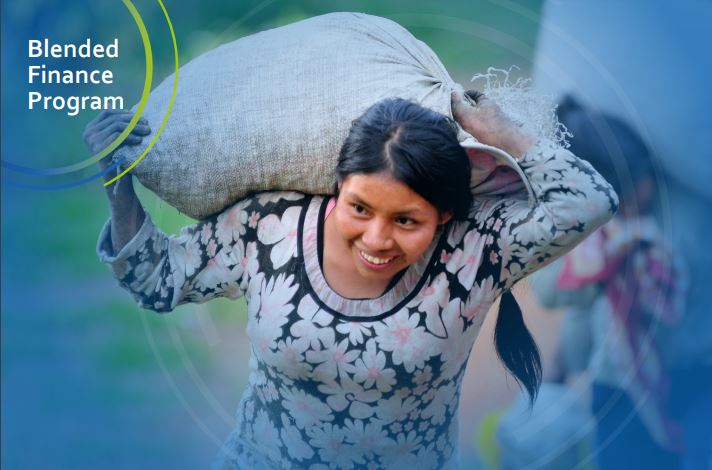 How to use public funds more effectively and mobilize private investment to achieve the Sustainable Development Goals (SDGs) while delivering positive impact? How to use public funds more effectively and mobilize private investment to achieve the Sustainable Development Goals (SDGs) while delivering positive impact?
This three-day learning experience will provide valuable insights on strategies and instruments to “leverage” own resources by blending them with private investment for small and growing businesses in developing and emerging countries. It will also shed light on the whole spectrum of finance for impact and international development. A specific focus will be on catalytic financing tools that are able to attract additional capital for high-impact enterprises. The program is organised by the Initiative for Blended Finance at the University of Zurich, with program partners Roots of Impact, Center for Sustainable Finance and Private Wealth at the University of Zurich, and Convergence.
More information here. Apply before April 30th 2023 to benefit from the early bird discount.
03 Jul 2023 in Hotel Grenzfall, Berlin, Germany
03 July to 11 July 2023
03 July to 11 July 2023
in Hotel Grenzfall, Berlin, Germany
03 July in Hotel Grenzfall, Berlin, Germany

The Summer Academy is a five-day residential international event on economic development. - At the Summer Academy, participants are introduced to Mesopartner’s approach to Local Economic Development (LED), which brings together experiences and instruments from Local and Regional Economic Development (LRED), Bottom-Up Industrial Policy, Innovation Systems, Complexity Thinking and Market System Development.
- Due to Mesopartner's diverse work globally, participants will benefit from different perspectives from the trainers and the international participants offer unique exposure to multi-cultural perspectives and experience in development economics.
- The Mesopartner Summer Academy will deepen your understanding of systemic economic change processes and enable you to better guide your organisation or project to shape that process.
- Learn how to offer the knowledge that local actors need to address the challenge of innovation and change in a systemic and complexity-sensitive way.
- Learn how to use innovative tools based on local and regional economic development, cluster and value chain promotion, market systems development, strengthening of local innovation systems and related topics.
- Learn how to facilitate development processes and give policy advice.
Learn more and also read what others say about the Summer Academy.
22 Jun 2023
22 June 2023
22 June 2023
22 June
June 22, 2023 in Bern. Save the date, more information to follow
15 Jun 2023
15 June 2023
15 June 2023
15 June
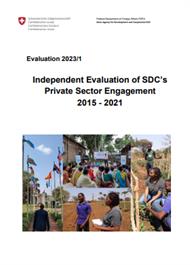
SDC uses Private Sector Engagement (PSE) in order to foster innovation and achieve greater impact. PSE are interventions where SDC and one or several private sector partners share a vision and join forces for an impact-driven development intervention, in support of the SDC's existing strategies.
oin the webinar on the evaluation on Thursday, June 15th Jointly, the Evaluation and Controlling Specialist Service and the Economy and Education Section / Center for the Engagement with the Private Sector invite you to join the webinar on this evaluation. The evaluation team will present the main findings, conclusions and recommendations. This is followed by the presentation of the Senior Management Response and a discussion. When: Thursday, June 15th, 2023, 13h00 – 14h15 (CET)
Where: Please join by this MS-Teams-Link
(a meeting request will follow shortly). Agenda: - Welcome (Reto Thönen, Evaluation Officer, Specialist Service Evaluation and Controlling, 5 minutes)
- Introductory Remarks (Ambassador Christian Frutiger, Head of Thematic Cooperation, 10 minutes)
- Presentation of the main findings, conclusions and recommendations (Alexandre Daoust, Lead Evaluator, Beatrice Tschinkel, Senior Evaluator, Le Groupe Conseil Baastel, 15 minutes)
- Presentation of the Senior Management Response (Luca Etter, Senior Policy Advisor, Section Economy and Education/Competence Center for the Engagement with the Private Sector, 10 minutes)
- Questions and answers, discussion (all, 20 minutes)
- Concluding Remarks (Patrick Egli, Head, Section Economy and Education/Competence Center for the Engagement with the Private Sector, 10 minutes)
- Closing (Reto Thönen, 5 minutes)
The webinar will be held in English. Link to the presentation Link to the evaluation report including management response.
21 Mar 2023 in Online
21 March 2023
21 March 2023
in Online
21 March in Online
Recording
Background
Social and Impact Enterprises (SIEs) – private organizations that aim to provide a market solution for the SDGs while being profitable - are an increasingly important partner of SDC’s when it comes to working towards sustainable solutions for social and environmental problems and achieving the SDGs. Last year, SDC published a guidance note on how to best work with SIEs, learning from experiences in different SDC priority sectors and countries. The Scaling Social Enterprise in Bangladesh – or B-Briddhi - Programme is the first comprehensive, country specific SDC initiative to support SIEs in the achievement of development outcomes. Last year, an external midterm evaluation looked at the first three years of B-Briddhi’s implementation. During this webinar we would like to learn from this experience and share lessons that will be of relevance to other SDC countries and regions interested in working through or with SIEs.
How to join? The event will take place on Zoom: https://us02web.zoom.us/j/85142099891?pwd=QXAvQUF5eGlNb0hpN0RlSmRmYVJvZz09 Meeting ID: 851 4209 9891 Passcode: 696488
Agenda
Time | What? | Who? | 13.00 – 13.05 | Welcome and Introduction | Corinne Henchoz, Deputy Head of Cooperation, Swiss Embassy Dhaka | 13.05 – 13.15 | Program Overview B-Briddhi – Scaling Social Enterprises Bangladesh Program Information
| Maxime Cheng, Lead Impact Intelligence & Education, Roots of Impact | 13.15 – 13.35 | Presentation of the main findings of the -B-Briddhi Programme Evaluation | E.T. Jackson, Lead Evaluator | 13.35 – 13.45 | Q+A |
| 13.45 – 14.05 | Discussion: What can we at SDC learn from Bangladesh and other SIE experiences to effectively work with SIEs in reaching our objectives? | Andrea Inglin, Senior Policy Advisor, SDC Education and Economy Section
Rebecca Bucherer, Regional Thematic Advisor PSE, SDC Asia and Latin Americ Domain
Ameena Chowdhury, Program Manager, SDC Bangladesh
| 14.05 – 14.10 | Q and A |
| 14.10 – 14.15 | Closing Remarks | Luca Etter, Senior Policy Advisor, SDC Education and Economy Section |
Moderator: Luca Etter, Senior Policy Advisor, SDC Education and Economy Section
27 Feb 2023 in ETH Zürich
27 February to 04 March 2023
27 February to 04 March 2023
in ETH Zürich
27 February in ETH Zürich
This course provides a basic introduction to the concepts and methods behind market systems development (MSD), an approach to understanding and overcoming the failure of systems to serve the needs of the poor. Contrary to traditional project approaches, in which implementing agencies provide or support services that go directly to the poor, an agency applying MSD acts as a facilitator to align key players and functions of a system to produce sustainable results. The approach was originally developed to analyse and strengthen market systems and private sector development — which will be the focus of the course. Today, the approach is also applied to systems with predominantly public sector activities, such as education systems. Link to NADEL ETH Zürich
13 Feb 2023 in Switzerland/online
13 February to 04 July 2023
13 February to 04 July 2023
in Switzerland/online
13 February in Switzerland/online

Public Entrepreneurship Academy 2023
To realise the UN Sustainable Development Goals in an environment of mounting complexity and uncertainty, there is an increasing need to build, leverage and scale partnerships across different sectors, involving public, private and civil society actors.
The Public Entrepreneurship Academy equips practitioners from the public sector with the mind-set, tools and skills to implement the 2030 Agenda through impact-driven private sector engagement, collaboration and entrepreneurial action.
The Public Entrepreneurship Academy is an immersive learning journey. Over the course of a half year, participants gain key knowledge in general management, entrepreneurship, agile co-creation, innovation and systems thinking. They learn while doing, integrating new ideas directly into their own work with the support of peers and individual coaching. They become part of a community of “public entrepreneurs”, collaboratively defining how to realise impact-driven private sector engagement.
Registration deadline is October 30 2022. You’ll find all the necessary information here: CSI-HSG / PEA.
In case of questions: Head of Executive Education at the Competence Center for Social Innovation at the University of St.-Gallen: rachel.brooks@unisg.ch. Contact person at the SDC’s Competence Center for Private Sector Engagement (CEP): bernard.zaugg@eda.admin.ch.
12 Jan 2023
12 January 2023
12 January 2023
12 January
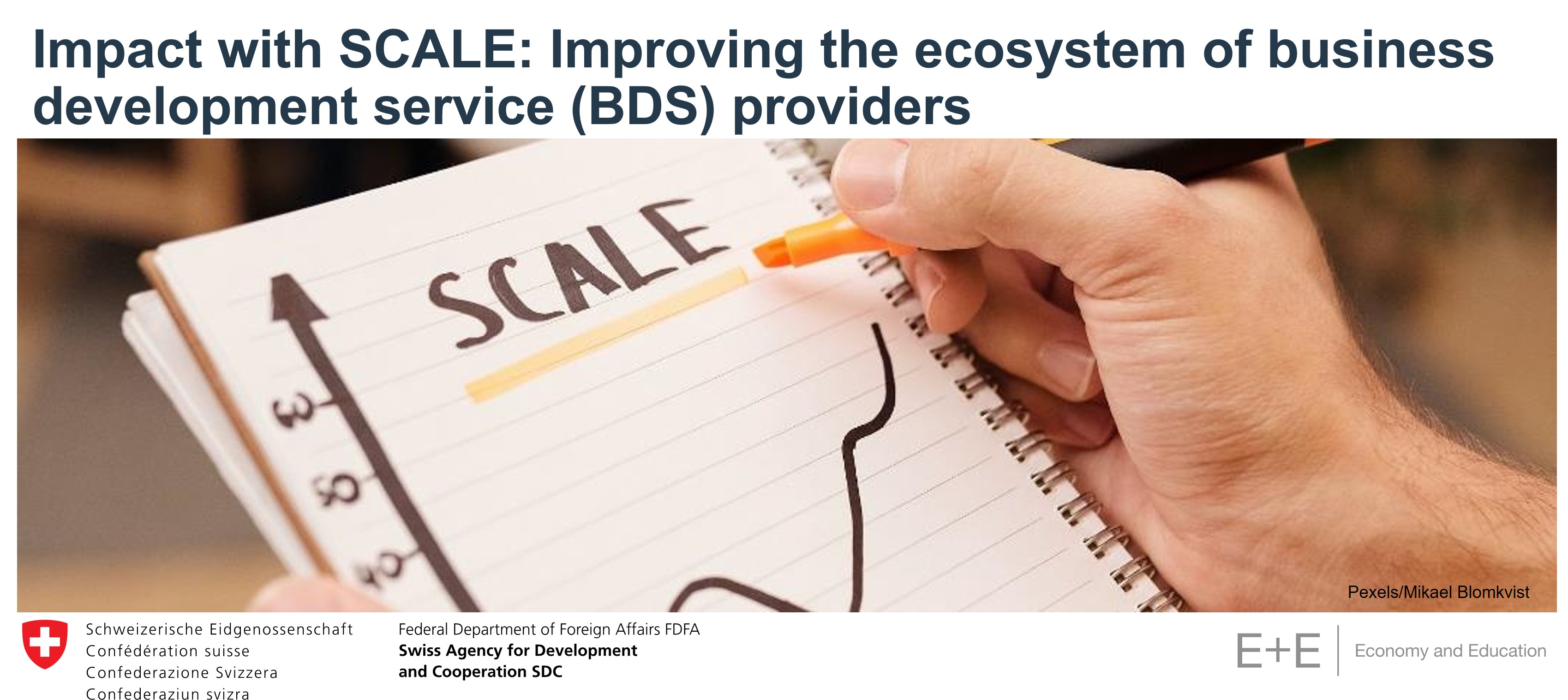
The webinar “Impact with SCALE: Improving the ecosystem of business development service (BDS) providers”, took place online on 12 January 2023 from 15:30 to 17:00 CET (Swiss time). During this webinar, participants had the opportunity to learn how simple, cost-effective, changes in relation to SCALE characteristics improve an entrepreneur's journey to success and their enterprise's ability to create impact. Why do some enterprise support programs make little to no meaningful difference whereas others prove transformative in accelerating enterprise growth, employment gain, ability to raise capital, and the expansion of enterprises delivering social and environmental goods? SCALE refers to five fundamental considerations that distinguish high-performing BDS programs, and offers BDS providers and funders guidance on how to implement practices that improve the effectiveness of BDS programs: Select Charging Address Learning Example. This session: - showcased the impact of evidence-based approaches; and
- provided examples of how funders and enterprise support organizations (ESOs) have responded to the evidence to boost impact
Presentations Introduction Summary of SCALE, by Harry Devonshire, Argidius Foundation The story of Bpeace’s accelerating impact, by Alexandra Salas, Bpeace The story of Small Foundation’s integration of SCALE into the funding of rural MSME ecosystems, by Karina Wong, Small Foundation
Recording
More information: An animation of the SCALE characteristics is available here, and the full report is available here in English; French; Spanish and Portuguese See as well the report and toolkit from the Argidius Foundation: link
Contact person: Peter Beez, SDC Economy and Education Senior Policy Advisor for Private Sector Development
23 Nov 2022 in Berne / online
23 November to
23 November to
in Berne / online
23 November in Berne / online
November 23th 2022, 14:30 to 17:30 CEST, Berne (Kursaal) and online This HELVETAS symposium looks at how development organizations and donors partner with large companies to achieve impact and reach with their operations. These partnerships are key to achieving the SDGs. But such collaborations carry risks, since the goals and values of the partners may differ. International experts will offer insights on creating partnerships that foster mutual understanding and avoid pitfalls. >> sign up
14 Jun 2022 in Zuerich
14 June 2022
14 June 2022
in Zuerich
14 June in Zuerich
Building on the course Microfinance ‒ Introduction, this seminar conveys the skills necessary for analyzing investment opportunities and understanding investment strategies, risk mitigation, and new developments in investments in financial inclusion. This course is designed for all those who are interested in investments in or funding for microfinance institutions and financial sector development. The target audience includes social microfinance investors, asset and portfolio managers with a focus on socially responsible investments, staff of development agencies and NGOs-family offices, and consultants. >> here
|
